Forensic Psychology Book of The Month
Want To Study Forensic Psychology?
Must Read Forensic Psychology Books
Back by Popular Demand
Welcome to the forensic psychology book of the month page. I decided to relaunch this page on the website in response to a number of e-mails I received, so many thanks to all of you who got in touch.
Whether you are new to forensic psychology, currently studying the topic, or consider yourself an expert in the field, each of the books featured as a forensic psychology book of the month will have something to offer you. They will also help further your understanding of the application of psychology within the criminal justice system and/or specific areas of forensic psychology theory and practice.
May 2017
Think you have a good memory? Think again. Memories are our most cherished possessions. We rely on them every day of our lives. They make us who we are. And yet the truth is they are far from being the accurate record of the past we like to think they are. True, we can all admit to having suffered occasional memory lapses, such as entering a room and immediately forgetting why, or suddenly being unable to recall the name of someone we've met dozens of times. But what if we have the potential for more profound errors of memory, even verging on outright fabrication and self-deception?
In The Memory Illusion, forensic psychologist and memory expert Dr. Julia Shaw uses the latest research to show the astonishing variety of ways in which our brains can indeed be led astray. She shows why we can sometimes misappropriate other people's memories, subsequently believing them to be our own. She explains how police officers can imprison an innocent man for life on the basis of 300 denials and just one confession. She demonstrates the way radically false memories can be deliberately implanted, leading people to believe that they brutally murdered a loved one, or were abducted by aliens. And she reveals how, in spite of all this, we can improve our memory through simple awareness of its fallibility.
Fascinating and unnerving in equal measure, The Memory Illusion offers a unique insight into the human brain, challenging you to question how much you can ever truly know about yourself.
You can buy this great book on Amazon via the following link.
The Memory Illusion: Why You Might Not Be Who You Think You
April 2017
A child is gunned down by a police officer; an investigator ignores critical clues in a case; an innocent man confesses to a crime he did not commit; a jury acquits a killer. The evidence is all around us: Our system of justice is fundamentally broken.
But it’s not for the reasons we tend to think, as law professor Adam Benforado argues in this eye-opening, galvanizing book. Even if the system operated exactly as it was designed to, we would still end up with wrongful convictions, trampled rights, and unequal treatment. This is because the roots of injustice lie not inside the dark hearts of racist police officers or dishonest prosecutors, but within the minds of each and every one of us.
This is difficult to accept. Our nation is founded on the idea that the law is impartial, that legal cases are won or lost on the basis of evidence, careful reasoning and nuanced argument. But they may, in fact, turn on the camera angle of a defendant’s taped confession, the number of photos in a mug shot book, or a simple word choice during a cross-examination. In Unfair, Benforado shines a light on this troubling new field of research, showing, for example, that people with certain facial features receive longer sentences and that judges are far more likely to grant parole first thing in the morning.
Over the last two decades, psychologists and neuroscientists have uncovered many cognitive forces that operate beyond our conscious awareness. Until we address these hidden biases head-on, Benforado argues, the social inequality we see now will only widen, as powerful players and institutions find ways to exploit the weaknesses of our legal system.
Weaving together historical examples, scientific studies, and compelling court cases—from the border collie put on trial in Kentucky to the five teenagers who falsely confessed in the Central Park Jogger case - Benforado shows how our judicial processes fail to uphold our values and protect society’s weakest members. With clarity and passion, he lays out the scope of the legal system’s dysfunction and proposes a wealth of practical reforms that could prevent injustice and help us achieve true fairness and equality before the law.
You can buy this great book on Amazon via the following link.
Unfair: The New Science of Criminal Injustice
March 2017
The Psychology of Arson is the first book in its field to focus specifically on contemporary topics relevant to practitioners and professionals working with adolescent and adult deliberate firesetters. Rebekah Doley, Geoffrey Dickens and Theresa Gannon have integrated the very latest information regarding prevalence, theory, research and practice in one accessible resource, and provide practical advice, strategies and techniques in a context of evidence-based research which will be invaluable for all treatment providers who work in the field of deliberate fire setting.
Unique features of this book include chapters considering community awareness, strategies, survivors of arson, filicide and suicide by fire, as well as a new treatment model developed on the basis of the latest research in the field. It is divided into four parts:
- Theories and typologies of firesetting.
- Legal, investigative and preventative issues.
- Assessment and risk assessment of deliberate firesetters.
- Treatment, needs and management of deliberate firesetters.
The Psychology of Arson provides the first scientist-practitioner model for the treatment of arson offenders. It will be an essential resource for forensic psychiatrists, clinical psychologists and other professionals working with this client group.
February 2017
Forensic CBT: A Handbook for Clinical Practice is an edited collection that represents the first authoritative resource on the utilization of CBT strategies and techniques for offender clients.
Features contributions from leaders of the major schools of CBT on the treatment of antisocial personality patterns as well as anger, interpersonal violence, substance abuse, and sexual aggression.
Addresses modified CBT approaches for female, juvenile, and culturally diverse forensic populations.
Covers emerging areas of forensic practices, including the integration of motivational interviewing and strength-based approaches.
Includes an assortment of worksheets, handouts, and exercises for practitioners to use with their clients.
January 2017
This book brings together an international group of experts to present cutting-edge psychological research on crime, policing and courts. With contributors from the UK, Germany, Italy, Norway, Cyprus, Israel, Canada and the USA, this volume explores some of the most interesting and contemporary areas of criminological and legal psychology.
The Psychology of Crime, Policing and Courts is divided into three parts. Part I explores crime and anti-social behaviour, including the concentration of offending within families, juvenile delinquency, adolescent bullying, cyberbullying, violence risk assessment, and psychopathy. Part II examines policing and the detection of deception, with chapters on interrogational practices, police interviews of children, and modern detection methods. Part III focuses on courts and sentencing, with chapters exploring wrongful convictions, the role of juries, extra-legal factors in sentencing decisions and an examination of sentencing itself.
Representing the forefront of research in developmental criminology and criminological and legal psychology, this book is a comprehensive resource for undergraduate and postgraduate students studying psychology and criminology, with particular value for those studying forensic psychology. This book is also a valuable resource for psychologists, lawyers, social scientists and law enforcement personnel.
December 2016
This textbook is designed for graduate students learning forensic assessment and psychologists coming to forensic practice later in their careers. It is organized around five broad areas:
1. Professional and Practice Issues.
2. Adult Forensic Assessment.
3. Juvenile Forensic Assessment.
4. Civil Forensic Assessment.
5. Communicating Your Findings.
Each chapter begins with a strong teaching and learning foundation. The latter part of each chapter is assessment specific, covering available assessment measures and approaches to assessment. The authors go well beyond simple descriptions of assessment measures and provide a conceptual discussion of the evaluation process that helps the reader understand how assessment measures fit into the overall evaluation process. The evaluation component is geared toward assessing the important aspects of the construct as laid out in the early part of each chapter. Each chapter then concludes with a case example to illustrate the measures and techniques described.
November 2016
Communication in Forensic Contexts provides in-depth coverage of the complex area of communication in forensic situations. Drawing on expertise from forensic psychology, linguistics and law enforcement worldwide, the text bridges the gap between these fields in a definitive guide to best practice.
- Offers best practice for understanding and improving communication in forensic contexts, including interviewing of victims, witnesses and suspects, discourse in courtrooms, and discourse via interpreters.
- Bridges the knowledge gaps between forensic psychology, forensic linguistics and law enforcement, with chapters written by teams bringing together expertise from each field.
- Published in collaboration with the International Investigative Interviewing Research Group, dedicated to furthering evidence-based practice and practice-based research amongst researchers and practitioners.
- International, cross-disciplinary team includes contributors from North America, Europe and Asia Pacific, and from psychology, linguistics and forensic practice.
October 2016
Forensic psychology is where psychology meets the criminal justice system. An understanding of the intersection of criminal law and psychological issues relating to criminal responsibility is critical for criminal justice students. This accessible text focuses on the criminal law implications of forensic psychology as it relates to topics such as competency to stand trial, state of mind at the time of the crime, suicide by cop, and involuntary psychiatric medication administered in custody.
Unlike more traditional texts on this topic, which are primarily concerned with the clinical practice of forensic psychology, this book focuses on critical thinking as it relates to these topics. Each chapter presents a critical analysis of the topic under study, going beyond merely identifying the legal parameters of criminal responsibility to explore the ethical, philosophical, and theoretical foundations of that concept.
September 2016
Psychologists have always played a key role in determining how the juvenile justice system assesses and treats young offenders. Recent neuropsychological findings shows that there are important developmental differences between juvenile offenders, such as varying levels of maturity, risk potential, and amenability to treatment, not to mention individualized personality traits and possible mental disorders. Psychologists must therefore strive for targeted rehabilitation services to avoid unfair treatment and redirect youth to healthier life choices.
This book is a practical guide that will help psychologists answer important psycho-legal questions to properly assess and treat juvenile offenders. These guidelines primarily focus on disposition evaluations, which describe adolescent offenders and paths to rehabilitation, and transfer evaluations, which determine whether juveniles should be moved to adult courts. Psychological assessments can greatly influence a judge s decision, so this book will help forensic clinicians consider important external factors, such as local laws and the political climate, and present assessment data to judges in a thorough, understandable manner.
This book will also be valuable for attorneys, judges, criminologists, and legal scholars who want to understand the psychological science behind juvenile assessment.
August 2016
"The" "Wiley-Blackwell Handbook on the Psychology of Violence" presents a collection of original readings that explore all major aspects of the psychology of violence, aggression, and other criminal behaviors. Utilizing an interdisciplinary approach, readings are contributed by a diverse group of experts, including psychologists, criminologists, sociologists, and others.
Coverage is included on topics that range from general issues relating to violence and victimization to emerging problems of online violence and cybercriminal behaviors. Other topics covered include aspects of juvenile violence, sexual violence, family violence, and various violence issues relating to underserved and/or understudied populations. Featuring the most current empirical evidence and theoretical findings, "Handbook on the Psychology of Violence" is an invaluable resource for all those with an interest in the current state of violence research, practice, and policy.
July 2016
Evidence law is meant to facilitate trials that are fair, accurate, and efficient, and that encourage and protect important societal values and relationships. In pursuit of these often-conflicting goals, common law judges and modern drafting committees have had to perform as amateur applied psychologists. Their task has required them to employ what they think they know about the ability and motivations of witnesses to perceive, store, and retrieve information; about the effects of the litigation process on testimony and other evidence; and about our capacity to comprehend and evaluate evidence. These are the same phenomena that cognitive and social psychologists systematically study.
The rules of evidence have evolved to restrain lawyers from using the most robust weapons of influence, and to direct judges to exclude certain categories of information, limit it, or instruct juries on how to think about it. Evidence law regulates the form of questions lawyers may ask, filters expert testimony, requires witnesses to take oaths, and aims to give lawyers and factfinders the tools they need to assess witnesses’ reliability. But without a thorough grounding in psychology, is the “common sense” of the rulemakers as they create these rules always, or even usually, correct? And when it is not, how can the rules be fixed?
Addressed to those in both law and psychology, The Psychological Foundations of Evidence Law draws on the best current psychological research-based knowledge to identify and evaluate the choices implicit in the rules of evidence, and to suggest alternatives that psychology reveals as better for accomplishing the law’s goals.
June 2016
Forensic Psychological Assessment in Practice: Case Studies presents a set of forensic criminal cases as examples of a scientist-practitioner model for forensic psychological assessment. The cases involve a number of forensic issues, such as criminal responsibility, violence risk assessment, treatment planning, and referral to long term forensic care. Likewise, different types of offenses are covered, for example, sexual offending, arson, homicide, robbery and domestic violence.
The authors address a variety of mental disorders including psychosis, posttraumatic stress disorder, psychopathy and other personality disorders. The book will be useful for novice and experienced forensic psychologists who are looking for case studies that integrate the most recent empirical evidence with psychological test findings. See following link for full details.
August 2013
Clinical Assessment of Malingering and Deception Edited By Richard Rogers
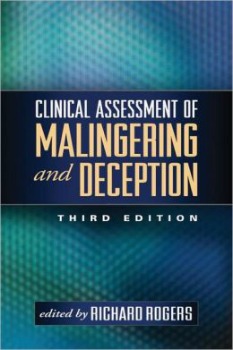
Book Description
Widely regarded as the standard reference in the field, this book provides essential tools for understanding and assessing malingering and other response styles in forensic and clinical contexts. An integrating theme is the systematic application of detection strategies as conceptually grounded, empirically validated methods that bridge different measures and populations. Special topics include considerations in working with children and youth.
From leading practitioners and researchers, the volume reviews the scientific knowledge base and offers best-practice guidelines for maximizing the accuracy of psychological and psychiatric evaluations. See following link for full details:
Clinical Assessment of Malingering and Deception
July 2013
Suggestibility in Legal Contexts: Psychological Research and Forensic Implications By Anne M. Ridley, Fiona Gabbert & David J. La Rooy
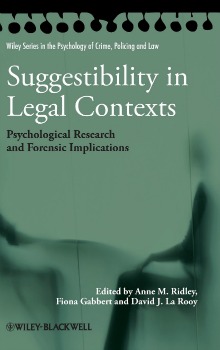
Book Description
A comprehensive survey of the theory, research and forensic implications related to suggestibility in legal contexts that includes the latest research.
See following link for full details:
Suggestibility in Legal Contexts: Psychological Research and Forensic Implications
June 2013
Handbook on Psychopathy and Law By Kent A. Kiehl & Walter P. Sinnott-Armstrong
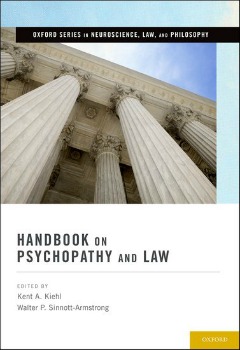
Book Description
Psychopaths constitute less than 1% of the general population but over 20% of prison populations. They commit a disproportionate amount of crime and violence in society. Given that the economic burden of crime in the United States is estimated to be over $2.3 trillion per year, psychopaths likely constitute one of the most expensive mental health conditions known today. This volume chronicles the latest science of psychopathy and the various ways the condition intersects with the criminal justice system.
From the modern techniques to assess the symptoms, to its utility in predicting violent recidivism, to the latest neuroscience youth and adults, and the most promising avenues for treatment, this volume captures the modern science of the condition and discusses ethical and legal issues surrounding psychopaths. See following link for full details:
Handbook on Psychopathy and Law
May 2013
Forensic Uses of Clinical Assessment Instruments By Robert Archer & Elizabeth Wheeler
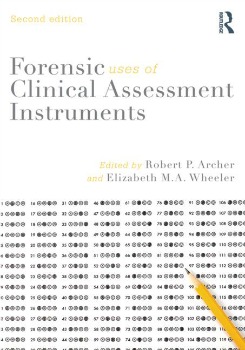
Book Description
This book provides, in a single volume, an extensive, research-based evaluation of the most popular clinical assessment tools as applied in forensic settings. These widely used instruments often require important modifications in their administration and interpretation when used for forensic purposes, and it is vital that the clinician is intimately familiar with their correct application, as well as their limitations. The test instruments included are analyzed by senior figures in the field of psychological assessment who are uniquely qualified to discuss them because they have either had a crucial role in the development of the tests, or they have dedicated their careers to advancing our understanding of these clinical assessment measures.
Each chapter begins with a summary of the development of the assessment instrument in its more traditional applications in clinical settings, and then considers its utilization in forensic settings. The types of forensic issues which have been addressed with that instrument are reviewed, and an illustrative case example is given which reflects the types of uses and limitations of the assessment technique when applied in a forensic context. New in this edition are a chapter on the MMPI-2-RF and separate chapters for the adult and youth versions of the Hare Psychopathy Checklist. Psychologists using assessment instruments in applied forensic settings will find this to be a valuable and practical source of information, as will attorneys wishing to gain an understanding of the application of these psychological assessment approaches in the courtroom. See following link for full details:
Forensic Uses of Clinical Assessment Instruments
April 2013
Mild Traumatic Brain Injury: Symptom Validity Assessment and Malingering By Dominic Carone & Shane Bush
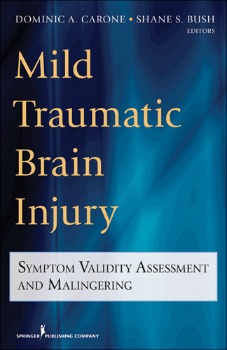
Book Description
This authoritative volume is the first book specifically devoted to symptom validity assessment with individuals with a known or suspected history of mild traumatic brain injury (MTBI). It brings together leading experts in MTBI, symptom validity assessment, and malingering to provide a thorough and practical guide to the challenging task of assessing the validity of patient presentations after an MTBI. The book describes techniques that can drastically alter case conceptualization, treatment, and equitable allocation of resources. In addition to covering the most important symptom validity assessment methods, this timely volume provides guidance to clinicians on professional and research issues, and information on symptom validity testing in varied populations.
The book covers MTBI assessment in such specific settings and populations as clinical, forensic, sports, children, gerontological, and military. It also addresses professional issues such as providing feedback to patients about symptom validity, ethical issues, and diagnostic schemas. Mild Traumatic Brain Injury will provide neuropsychologists, referring health care providers, courts, disability insurance companies, the military, and athletic teams/leagues with the in-depth, current information that is critical for the accurate and ethical evaluation of MTBI. See following link for full details:
Mild Traumatic Brain Injury: Symptom Validity Assessment and Malingering
March 2013
The Abraham Man: Madness, Malingering and the Development of Medical Testimony By Dr. R. Gregory Lande
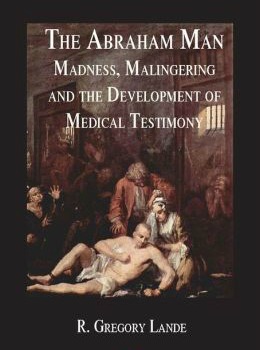
Book Description
The mere mention of the insanity defense guarantees a lively debate. Opponents of the defense cite the loss of criminal culpability while proponents argue just as passionately that the insanity defense is the ultimate act of compassion. The protagonists would probably be quite surprised to learn that the same basic concerns consumed Americans in the nineteenth century. One factor – The Abraham Man – sowed the seeds of confusion and controversy that united the past with the present.
Some of the most celebrated civil and criminal trials in American history were argued under the shadow of the Abraham Man. The detailed stories of long forgotten legal cases bring the antics of the Abraham Man to life. Through the process, readers will follow the careers of notable Civil War era surgeons whose post-war professional development shaped the future of modern mental health care. See following link for full details:
The Abraham Man: Madness, Malingering and the Development of Medical Testimony
February 2013
Managing Clinical Risk: A Guide to Effective Practice (Issues in Forensic Psychology). Edited By Caroline Logan & Lorraine Johnstone
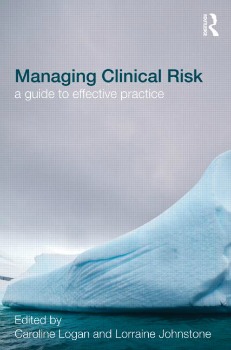
Book Description
Violence directed towards others and violence directed towards oneself cause an immense amount of physical and psychological damage – to the harmed and the harmful person alike, to their families, and to the public at large. Managing clinical risk is an authoritative manual for practitioners working with harmful men, women, and young people, containing up-to-date information and guidance on what to do and how they can assess and manage clinical risk, communicate their concerns about risk, and account for their decisions about risk management to their clients and to the Courts.
This book provides an evidence-based understanding of risk in key areas of practice – violence, sexual violence, firesetting, suicide, and self-harm, working with individuals and organisations alike – and among special groups: women, young people, serving and former military personnel, clients with comorbid presentations, and clients with cognitive impairment. Further, it suggests and describes the skills practitioners need to understand and communicate their concerns to all who need to know about them through coverage of interviewing and risk formulation skills.
This is a guidebook to effective practice. All its contributors have a record of research, practice, and considered thinking in the area of clinical risk assessment and management. They all have a wide range of knowledge and experience about the notion of risk, conducting risk management in real world mental health, correctional, and community settings, and about working with clients with a label of high risk. Together, they combine theoretical and research knowledge with a wealth of practical skills in care and management, emphasising the collaborative and recovery-focused nature of modern risk management.
See following link for full details:
Managing Clinical Risk: A Guide to Effective Practice (Issues in Forensic Psychology)
January 2013
Profiling and Serial Crime: Theoretical and Practical Issues By Wayne Petherick
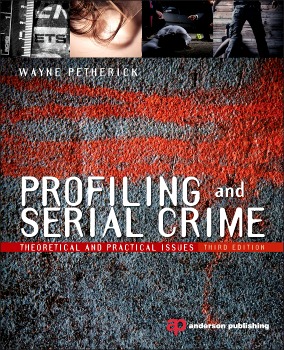
Book Description
Profiling and Serial Crime illustrates the promise, purposes, and pitfalls of behavioral profiling in the investigation of serial crime and provides a theoretical and practical foundation for students.
Part I, on profiling, examines the history, crucial issues, methods, theory, and treatment in the mainstream media. Part II examines serial crime in detail, including cyber-bullying, stalking, rape, murder, and arson.
In addition to the new and replacement chapters, this edition has been thoroughly revised throughout to reflect the latest research in criminal profiling and serial crime.
See following link for full details:
Profiling and Serial Crime: Theoretical and Practical Issues
December 2012
Forensic Psychology By J. Pozzulo, C. Bennell & A. Forth
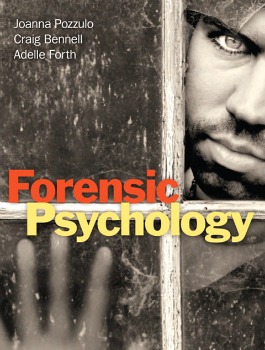
Book Description
This book takes a broad-based perspective, incorporating both experimental and clinical topics. This text includes current developments by theorists and researchers in the field. By focusing on multidisciplinary theories, readers gain an understanding of different forensic psychology areas, showing interplay among cognitive, biological, and social factors.
Readers will find that the ideas, issues, and research in this text are presented in a style that they will understand, enjoy, and find useful in their professional careers.
See following link for full details:
November 2012
Criminal Behavior: A Psychological Approach By Curt R. Bartol & Anne M. Bartol

Book Description
Designed for courses in Criminal Behavior, Criminology, Forensic Psychology, Crime and Delinquency and the Psychology of Crime this text approaches the understanding of delinquent and criminal behavior from a psychological perspective–with particular focus on the developmental, cognitive-behavioral aspects of offending.
Viewing the juvenile and adult offender as being embedded and continually influenced by multiple systems, it highlights how psychological, social, economic, political and ecological factors all play a role in influencing individual behavior. Streamlined in this edition, it offers a separate chapter on delinquency, updated examples and more on the link between psychology and specific crimes.
See following link for full details:
Criminal Behavior: A Psychological Approach (9th Edition)
October 2012
Handbook of Psychology, Volume 11, Forensic Psychology, 2nd Edition - Edited By Irving Weiner
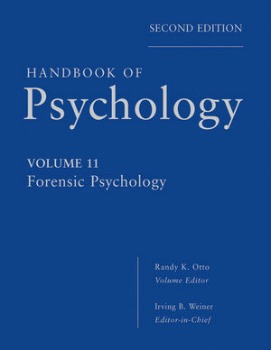
Book Description
Quite simply a must have book for anybody wanting access to the most current knowledge in the field of forensic psychology. Spanning the entire discipline and written by leading experts in the field the content within this comprehensive handbook is located within five main headings:
1. NATURE OF THE FIELD
2. FORENSIC EVALUATIONS IN CIVIL PROCEEDINGS
3. FORENSIC EVALUATIONS IN DELINQUENCY AND CRIMINAL PROCEEDINGS
4. SPECIAL ASSESSMENT ISSUES
5. FORENSIC CONSULTATION
See following link for full details:
Handbook of Psychology, Forensic Psychology (Volume 11)
September 2012
Children's Testimony: A Handbook of Psychological Research and Forensic Practice, 2nd Edition Edited By Michael E. Lamb, David J. La Rooy, Lindsay C. Malloy & Carmit Katz
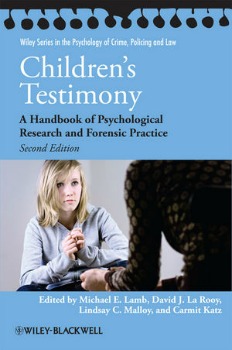
Book Description
The second edition of Children’s Testimony is a fully up-to-date resource for practitioners and researchers working in forensic contexts and concerned with children's ability to provide reliable testimony about abuse.
See following link for more details:
Children's Testimony: A Handbook of Psychological Research and Forensic Practice
August 2012
Jury Decision Making: The State of the Science By Dennis J. Devine
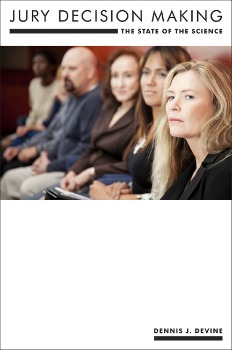
Book Description
While jury decision making has received considerable attention from social scientists, there have been few efforts to systematically pull together all the pieces of this research. In Jury Decision Making, Dennis J. Devine examines over 50 years of research on juries and offers a "big picture" overview of the field.
The volume summarizes existing theories of jury decision making and identifies what we have learned about jury behavior, including the effects of specific courtroom practices, the nature of the trial, the characteristics of the participants, and the evidence itself. Making use of those foundations, Devine offers a new integrated theory of jury decision making that addresses both individual jurors and juries as a whole and discusses its ramifications for the courts.
Providing a unique combination of broad scope, extensive coverage of the empirical research conducted over the last half century, and theory advancement, this accessible and engaging volume offers "one-stop shopping" for scholars, students, legal professionals, and those who simply wish to better understand how well the jury system works.
See following link for more details:
Jury Decision Making: The State of the Science
July 2012
In Doubt: The Psychology of the Criminal Justice Process By Dan Simon
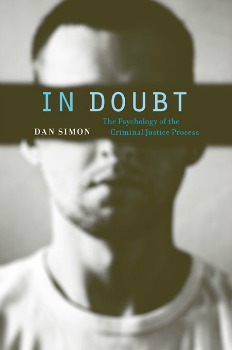
Book Description
The criminal justice process is unavoidably human. Police detectives, witnesses, suspects, and victims shape the course of investigations, while prosecutors, defense attorneys, jurors, and judges affect the outcome of adjudication. In this sweeping review of psychological research, Dan Simon shows how flawed investigations can produce erroneous evidence and why well-meaning juries send innocent people to prison and set the guilty free.
The investigator’s task is genuinely difficult and prone to bias. This often leads investigators to draw faulty conclusions, assess suspects’ truthfulness incorrectly, and conduct coercive interrogations that can lead to false confessions. Eyewitnesses’ identification of perpetrators and detailed recollections of criminal events rely on cognitive processes that are often mistaken and can easily be skewed by the investigative procedures used. In the courtroom, jurors and judges are ill-equipped to assess the accuracy of testimony, especially in the face of the heavy-handed rhetoric and strong emotions that crimes arouse.
Simon offers an array of feasible ways to improve the accuracy of criminal investigations and trials. While the limitations of human cognition will always be an obstacle, these reforms can enhance the criminal justice system’s ability to decide correctly whom to release and whom to punish.
See following link for more details:
In Doubt: The Psychology of the Criminal Justice Process
June 2012
Forensic Psychology: Crime, Justice, Law, Interventions By Graham M. Davies & Anthony R. Beech
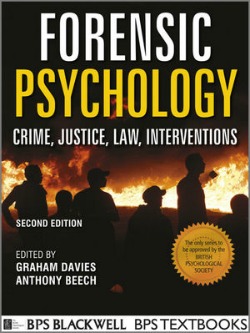
Book Description
Forensic psychology is a constantly growing discipline, both as a profession for graduates and in terms of student interest. This book highlights the often sizable gap between the media myths surrounding forensic practice and reality.
Graham Davies and Anthony Beech present an exciting and broad range of topics within the field including detailed treatments of the causes of crime, investigative methods, the trial process, and interventions with different types of offenders and offences.
Written by a mix of leading senior researchers and younger academics, Forensic Psychology draws on a wealth of experience in this popular subject area to produce a new edition that will interest and enthuse today’s generation of students.
Forensic Psychology is essential reading for all undergraduate courses in forensic psychology and an excellent introduction for more detailed postgraduate courses.
See following link for more details:
Forensic Psychology: Crime, Justice, Law, Interventions
May 2012
Police Interrogations and False Confessions: Current Research, Practice, and Policy Recommendations Editied By G. Daniel Lassiter & Christian A. Meissner
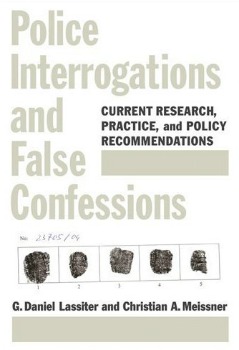
Book Description
Although it is generally believed that wrongful convictions based on false confessions are relatively rare the 1989 Central Park jogger wilding case being the most notorious example recent exonerations of the innocent through DNA testing are increasing at a rate that few in the criminal justice system might have speculated.
Because of the growing realization of the false confession phenomenon, psychologists, sociologists, and legal/law-enforcement scholars and practitioners have begun to examine the factors embedded in American criminal investigations and interrogations that may lead innocent people to implicate themselves in crimes they did not commit.
Police Interrogations and False Confessions brings together a group of renowned scholars and practitioners in the fields of social psychology, cognitive psychology, developmental psychology, criminology, clinical-forensic psychology, and law to examine three salient dimensions of false confessions: interrogation tactics and the problem of false confessions; review of Supreme Court decisions regarding Miranda warnings and custodial interrogations; and new research on juvenile confessions and deception in interrogative interviews.
Chapters include well-recognized programs of research on the topics of interrogative interviewing, false confessions, the detection of deception in forensic interviews, individual differences, and clinical-forensic evaluations.
See following link for more details:
April 2012
Research in Practice for Forensic Professionals (Issues in Forensic Psychology) Editied By Kerry Sheldon, Jason Davies & Kevin Howells
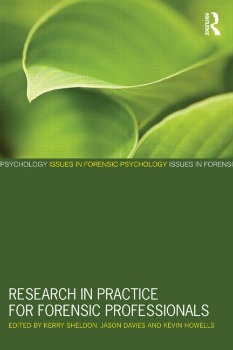
Book Description
Research in Practice for Forensic Professionals explores applied research methods used in forensic settings – prisons, the probation service, courts and forensic mental health establishments – and provides a comprehensive 'how-to' guide for forensic practitioners and researchers.
It provides practitioners and researchers with grounding in the practical techniques appropriate for research in applied forensic settings. This includes knowledge and skills of the research process and the wide range of research methods (both quantitative and qualitative) being applied in this arena. The text provides a critical understanding of the problems, challenges and ethical issues which can arise and ideas for managing these. Specific attention is paid to empirical research within forensic populations and settings including researching vulnerable groups (e.g. offenders and the mentally ill in secure settings), evaluating treatment programmes, and the uses and problems of randomised control trials.
The book is clearly structured, with each methodology chapter describing the background of the approach; the type of research questions addressed; design principles and issues; the types of analysis that can be utilised; strengths and limitations of the method; future directions and further sources of information. Through the inclusion of case studies and illustrative examples from forensic researchers and practitioners who have extensive experience of conducting applied research, this book tackles real-life problems typically faced by researchers and practitioners.
Research in Practice for Forensic Professionals is an essential one-stop resource for practitioners (such as psychologists, nursing and medical staff, prison and probation workers, social workers, occupational therapists) who have an interest in research and in evaluating their own work and the services in which they work. It will also be of interest to students studying areas of applied research, such as forensic psychology or applied criminology and those teaching them.
See following link for more details:
Research in Practice for Forensic Professionals (Issues in Forensic Psychology)
March 2012
Forensic Case Formulation Editied By Peter Sturmey & Mary McMurran
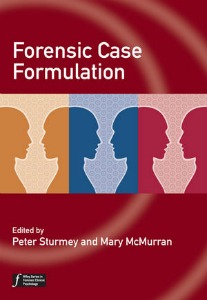
Book Description
Forensic Case Formulation is the first text that describes the principles and application of case formulation specifically to forensic clinical practice. The book:
See following link for more details:
Forensic Case Formulation (Wiley Series in Forensic Clinical Psychology)
February 2012
The Psychology of Eyewitness Identification By James Lampinen, Jeffrey Neuschatz & Andrew Cling
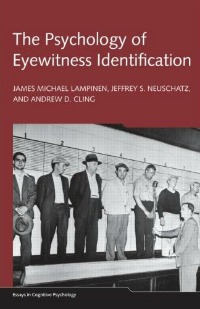
Book Description
The Psychology of Eyewitness Identification provides a tutorial review and evaluation of scientific research on the accuracy and reliability of eyewitness identification.
The book starts with the perspective that there are a variety of conceptual and empirical problems with eyewitness identification as a form of forensic evidence, just as there are a variety of problems with other forms of forensic evidence. There is then an examination of the important results in the study of eyewitness memory and the implications of this research for psychological theory and for social and legal policy.
The authors take the perspective that research on eyewitness identification can be seen as the paradigmatic example of how psychological science can be successfully applied to real-world problems.
See following link for more details:
The Psychology of Eyewitness Identification
January 2012
Introduction to Forensic and Criminal Psychology By Dennis Howitt
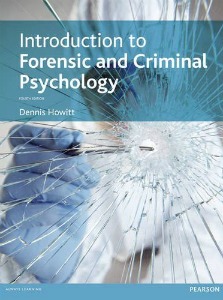
Book Description
With broad, in-depth coverage of this fascinating subject, Introduction to Forensic and Criminal Psychology remains the most authoritative, readable and popular text in the field. Theory is prominent throughout and a range of in-text features substantially enhanced in this new edition make this an engaging and valuable resource.
The fourth edition is revised to include new chapters on therapy in prison and the psychology of lie detection, and has greatly extended coverage of courtroom processes. It has been brought fully up-to-date with significant new research.
An interactive website supports this book at www.pearsoned.co.uk/howitt. This features a range of useful resources including multiple choice questions, example essay questions, links to further reading, a guide to becoming a forensic psychologist as well as interviews with researchers about their work in the field.
Clear and comprehensive, this is an essential textbook for undergraduates studying psychology, applied psychology and criminology. It is also extremely useful in many other subjects for which students need an understanding of how psychology relates to criminal justice and the law.
See following link for more details:
Introduction to Forensic and Criminal Psychology
December 2011
Forensic Neuropsychology: A Scientific Approach Edited By Glenn J. Larrabee
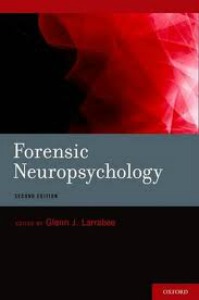
Book Description
Neuropsychologists are frequently asked to serve as experts for court cases where judgments must be made as to the cause of, and prognosis for, brain diseases and injuries, as well as the impact of brain dysfunction on legal competencies and responsibilities. This fully-updated second edition describes the application of neuropsychology to legal issues in both the civil and criminal courts.
The book emphasizes the scientific basis of neuropsychology, as well as using a scientific approach in addressing forensic questions. All of the contributors are recognized experts in their fields, and the chapters cover common forensic issues such as appropriate scientific reasoning, the assessment of malingering, productive attorney-neuropsychologist interactions, admissibility of neuropsychological evidence, and ethics.
Also covered are functional neuroimaging in forensic neuropsychology and the determination of damages in personal injury litigation, including pediatric brain injury (traumatic injury and perinatal birth injury), mild, moderate, and severe traumatic brain injury in adults, neurotoxic injury, chronic pain, post-traumatic stress disorder, and assessment of medically unexplained symptoms. Civil competencies in elderly persons with dementia are addressed in a separate chapter, and two chapters deal with the assessment of competency and responsibility in criminal forensic neuropsychology. The book closes with a perspective on trends in forensic practice and research.
See following link for more details:
Forensic Neuropsychology: A Scientific Approach
November 2011
Columbine By Dave Cullen

Book Description
On April 20, 1999, two boys left an indelible stamp on the American psyche. Their goal was simple: to blow up their school, Oklahoma-City style, and to leave "a lasting impression on the world." Their bombs failed, but the ensuing shooting defined a new era of school violence-irrevocably branding every subsequent shooting "another Columbine."
When we think of Columbine, we think of the Trench Coat Mafia; we think of Cassie Bernall, the girl we thought professed her faith before she was shot; and we think of the boy pulling himself out of a school window -- the whole world was watching him. Now, in a riveting piece of journalism nearly ten years in the making, comes the story none of us knew. In this revelatory book, Dave Cullen has delivered a profile of teenage killers that goes to the heart of psychopathology. He lays bare the callous brutality of mastermind Eric Harris, and the quavering, suicidal Dylan Klebold, who went to prom three days earlier and obsessed about love in his journal.
The result is an astonishing account of two good students with lots of friends, who came to stockpile a basement cache of weapons, to record their raging hatred, and to manipulate every adult who got in their way. They left signs everywhere, described by Cullen with a keen investigative eye and psychological acumen. Drawing on hundreds of interviews, thousands of pages of police files, FBI psychologists, and the boy's tapes and diaries, he gives the first complete account of the Columbine tragedy.
See following link for more details:
October 2011
Offenders, Deviants or Patients? Explorations in Clinical Criminology By Herschel Prins
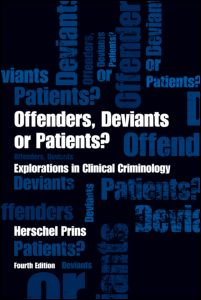
Book Description
Offenders, Deviants or Patients provides a practical approach to understanding both the social context and treatment of mentally disordered offenders. Taking into account the current public concern, often heightened by media sensationalism, it addresses issues such as sex offending, homicide and other acts of serious bodily harm.
This fourth edition comes after extensive new research by academics and professionals in the field and reflects recent changes in law, policy and practice.
Using new case examples, Herschel Prins examines the relationship between mental disorders and crime and looks at the ways in which it should be dealt with by the mental health care and criminal justice systems.
Offenders, Deviants or Patients? is unique in its multidisciplinary approach and will be invaluable to all those who come into contact with serious offenders or those who study crime and criminal behaviour.
See following link for more details:
Offenders, Deviants or Patients? Explorations in Clinical Criminology
September 2011
Dangerous People: Policy, Prediction, and Practice, Edited By Bernadette McSherry & Patrick Keyzer
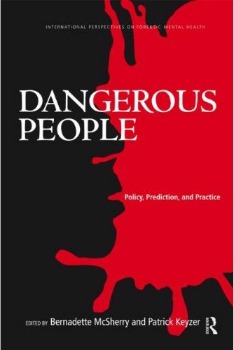
Book Description
Experienced legal academics and mental health professionals explore the current approaches to “dangerousness” and preventive detention. The defining characteristics of those deemed dangerous by society vary according to culture, place, and time, and the contributors to this text have gathered to analyze the policies and practices related to current out-groups such as sex offenders, suspected terrorists, and young offenders in the United States, Scotland, England, and Australia.
Dangerous People is the result of their research, workshopping, and writing. The text is organized logically and begins with a section on Parameters that explores the international human rights and legal limitations related to preventive detention schemes. It moves on to Policy, where contributors examine legislative policy, and Prediction, or risk assessment, especially in terms of violent crimes in youth. The section on Practice focuses on recent schemes to prevent re-offending.
This text is indispensible as a resource that deals with the practical issues surrounding preventive detention and supervision schemes, the assessment of the risk of future harm in offenders, and different programs and sentencing options for high-risk offenders with mental illnesses. It contains case examples that bring real-life issues to light and sets forth an agenda to provide effective ways to protect communities from harm.
See following link for more details:
August 2011
Forensic Psychology in Context: Nordic and International Approaches by Par Anders Granhag
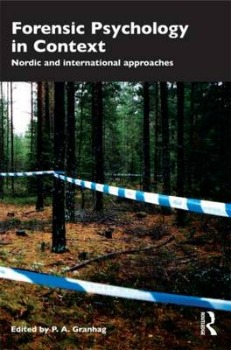
Book Description
Academics and researchers from the Nordic countries (Sweden, Iceland, Norway, Finland) have made a particularly strong contribution internationally to the rapidly developing disciplines of forensic and legal psychology. This book brings together the leading authorities in the field to look systematically at the central issues and concerns of their subject, looking at both investigative psychology and psychology in court.
Forensic Psychology in Context reflects the results of research in the Nordic countries themselves, but each chapter situates this work within a broader comparative and international context. The book is a major contribution to the subject, and will be essential reading for anybody with interests in this field.
See following link for more details:
Forensic Psychology in Context: Nordic and International Approaches
July 2011
Professionalizing Offender Profiling: Forensic and Investigative Psychology in Practice by Laurence Alison & Lee Rainbow

Book Description
Offender profiling is now viewed as an integral part of serious crime investigations by many law enforcement agencies across the world and continues to attract a high public and media profile. Despite almost three decades of research and developments in the field, the public impression of offender profiling is still influenced by misleading media portrayals, which fail to acknowledge the significant developments in theory, research and practice.
This book is the only book on the market to illustrate in detail the actual practice of Behavioural Investigative Advice, its diversity in application, the underpinning academic literature and the remaining research questions and recommendations. Focussing on the professionalization of this developing discipline, it provides a fascinating insight into the modern role of a Behavioural Investigative Adviser, dispelling many of the myths still associated with offender profiling, and illustrating the continued aspiration of contemporary practitioners to adhere to the highest scientific standards. It provides a journey through the significant efforts to professionalise both the process and product of Behavioural Investigative Advice, supported by relevant theoretical, methodological and operational considerations.
Edited by and containing contributions from some of the most respected and experienced researchers and practitioners working today, this book will be essential reading for Police Officers, researchers, students and anyone with an interest in the professionalization and contemporary contribution of forensic psychology to 21st century criminal investigation.
See following link for more details:
Professionalizing Offender Profiling: Forensic and Investigative Psychology in Practice
June 2011
Specialty Competencies in Forensic Psychology by Ira K. Packer & Thomas Grisso
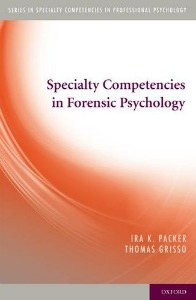
Book Description
Although Forensic Psychology was formally recognized as a specialty by the American Board of Professional Psychology in 1985 and by the American Psychological Association's Commission for the Recognition of Specialties and Proficiencies in Professional Psychology in 2001, its origins can be traced back to early applications of psychology to law during the time psychology was being differentiated from the more general field of philosophy.
As it is currently applied, the specialty took organizational shape from the 1960's to the 1990's, and today forensic psychology is one of the most popular areas of specialization among emerging psychologists. The demand for forensic training, continuing education, and research is growing in many graduate level professional programs and at events sponsored by the American Psychology-Law Division (41) of APA or the American Academy of Forensic Psychology. Therefore, the need for a comprehensive text focused on the competencies required in the specialty has never been greater.
With Specialty Competencies in Forensic Psychology, Drs. Packer and Grisso provide a guide to understanding legal systems, evaluations, and consultations encountered in day-to-day forensic practice that is simultaneously sophisticated, scholarly, and user-friendly. This is a must-read for all those interested in pursuing the forensic specialty practice.
See following link for more details:
Specialty Competencies in Forensic Psychology
May 2011
Research Methods in Forensic Psychology by Barry Rosenfeld & Steven Penrod
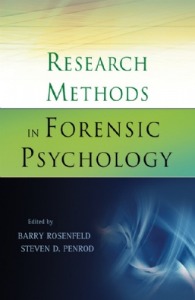
Book Description
The only professional resource to focus exclusively on research methods in forensic psychology. With specific advice on topics of particular importance to forensic specialists, Research Methods in Forensic Psychology presents state-of-the-discipline summaries of the issues that relate to psychology and law research.
Edited by renowned experts in the field, this resource features contributions by leading scholars in forensic psychology and law, with discussion of relevant topics such as:
This comprehensive guide is designed for a wide range of scholars and legal professionals, presenting a succinct overview of the field of psychology and law as viewed by some of the world's foremost experts.
See following link for more details:
Research Methods in Forensic Psychology
April 2011
Current Perspectives in Forensic Psychology and Criminal Behavior by Curt Bartol & Anne Bartol
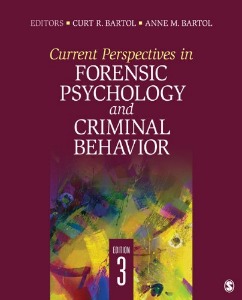
Book Description
This text is a dynamic forensic psychology reader that provides cutting-edge research in police and correctional psychology, the psychology of crime and victimization, and psychology as applied to criminal and civil courts. Addressing key topics in each of three major course areas - criminal behavior, forensic psychology, and psychology and law - the book highlights how forensic psychology has contributed to the understanding of criminal behavior and crime prevention.
Editors Curt R. Bartol and Anne M. Bartol have assembled published journal articles and written introductory commentaries to provide an overview of the wide array of prevalent practices and theories in this field.
See following link for more details:
Current Perspectives in Forensic Psychology and Criminal Behavior
March 2011
Introduction to Forensic Psychology: Clinical and Social Psychological Perspectives by Lenore Walker & David Shapiro
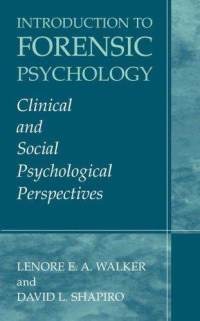
Book Description
This text provides a complete overview of the applications of psychology to the law. Incorporating the contributions of social and clinical psychology, this new text presents the material with an objective view towards the complete scope of the subject matter. In its clear coverage of the fundamentals of this field, it is an invaluable introduction for students, as well as a reference for practitioners.
See following link for more details:
Introduction to Forensic Psychology: Clinical and Social Psychological Perspectives
February 2011
Investigative and Forensic Interviewing: A Personality-focused Approach by Philip Erdberg, Craig Ackley, Kristen Beyer & Shannon Mack
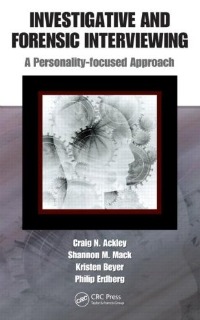
Book Description
Experienced investigators know that taking an interviewee’s personality into account can lead to a more productive interview outcome. This volume provides a window into the personality types most commonly encountered in the legal system and demonstrates how to use this insight to plan and conduct effective interviews.
The personality types discussed include narcissistic, antisocial, psychopathic, borderline, inadequate/immature, paranoid, and schizotypal. The book is designed for law enforcement officers, attorneys, probation and parole officers, mental health workers, and anyone else who interviews witnesses, suspects, and offenders throughout the legal system.
See following link for more details:
Investigative and Forensic Interviewing: A Personality-focused Approach
January 2011
Forensic and Legal Psychology by Mark Costanzo & Daniel Krauss
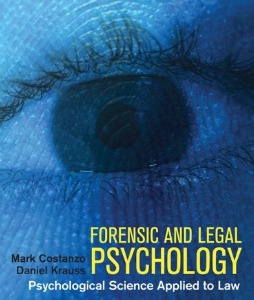
Book Description
Using research in clinical, cognitive, developmental, and social psychology, Forensic and Legal Psychology shows how psychological science can enhance the gathering and presentation of evidence, improve legal decision-making, prevent crime, rehabilitate criminals, and promote justice.
Although the emphasis is on psychological research, the textbook makes extensive use of actual cases and real trials to engage students and to illustrate the relevance of research findings. Written in a clear, student-friendly style, Forensic and Legal Psychology is designed for both the psychology and law and forensic psychology class.
See following link for more details:
December 2010
Psychological Therapy in Prisons and other Settings Edited by Joel Harvey & Kirsty Smedley

Book Description
This book examines a range of therapeutic approaches used in prisons and other secure settings and explores the challenges in such work. The approaches include cognitive-behavioural therapy (CBT), cognitive-analytic therapy (CAT), attachment-based psychodynamic psychotherapy and systemic psychotherapy.
It provides insights into debates about providing therapy in prisons and other secure settings and discusses specific topics such as mental health in-reach teams, working with women in prison, therapy within therapeutic communities and therapy with black and minority ethnic groups. This book addresses developments in mental healthcare by the National Health Service (NHS)within prisons and on-going policy developments which aim to improve access to psychological therapies for prisoners.
The contributors draw on experience both in clinical psychology and forensic psychology, as well as psychotherapy and criminology. They draw on experience too in a range of environments, including juvenile and young offender establishments, local prisons and dispersal prisons. Psychological Therapy in Prisons and Other Secure Settings will be essential reading for people who work to improve the psychological wellbeing of individuals in prisons and other secure settings.
See following link for more details:
Psychological Therapy in Prisons and other Settings
November 2010
The Cambridge Handbook of Forensic Psychology by Jennifer M. Brown & Elizabeth A. Campbell
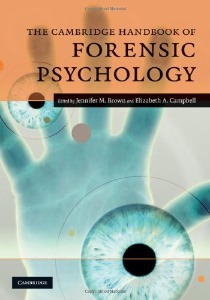
Book Description
Forensic psychology has developed and extended from an original, narrow focus on presenting evidence to the courts to a wider application across the whole span of civil and criminal justice, which includes dealing with suspects, offenders, victims, witnesses, defendants, litigants and justice professionals.
This handbook provides an encyclopedic-style source regarding the major concerns in forensic psychology. It is an invaluable reference text for practitioners within community, special hospital, secure unit, prison, probation and law enforcement forensic settings, as well as being appropriate for trainees and students in these areas. It will also serve as a companion text for lawyers and psychiatric and law enforcement professionals who wish to be apprised of forensic psychology coverage.
Each entry provides a succinct outline of the topic, describes current thinking, identifies relevant consensual or contested aspects and alternative positions. Readers are presented with key issues and directed towards specialized sources for further reference.
See following link for more details:
The Cambridge Handbook of Forensic Psychology
October 2010
Forensic Psychology by Adrian Scott
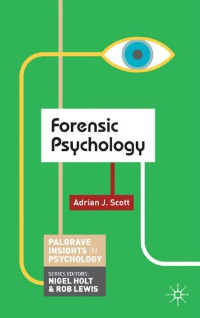
Book Description
This introduction shows the reader how much forensic psychology informs us about every step of the criminal process. From biological, social and cognitive theories of crime to eyewitness testimony and the penal system, this is essential reading for students seeking a deeper understanding of the key topics.
See following link for more details:
Forensic Psychology (Palgrave Insights in Psychology)
September 2010
Personality Disorder: The Definitive Reader (Forensic Focus) by Gwen Adshead & Caroline Jacob
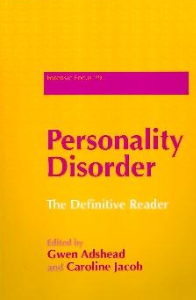
Book Description
Personality Disorder: The Definitive Reader offers a comprehensive and accessible collection of papers that will be practically useful to practitioners working in secure and non-secure settings with patients who have personality disorders.
This book brings together fourteen classic papers, which address the impact that working with personality disorder patients can have on staff. It also offers theoretical explanations for personality disorder, and explores other issues such as the concept of boundaries in clinical practice, psychiatric staff as attachment figures and the relationship between severity of personality disorder and childhood experiences.
Each paper is introduced with contextual material, and is followed by a series of questions that are intended to be used as educational exercises. This book will be essential reading for clinical and forensic psychologists, psychiatrists, community psychiatric nurses, social workers and students.
See following link for more details:
Personality Disorder: The Definitive Reader (Forensic Focus)
August 2010
Forensic Psychology: Concepts, Debate and Practice by Joanna R.Adler & Jacqueline M.Gray
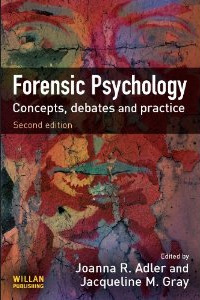
Book Description
This book brings together a team of authorities in the field of forensic psychology to demonstrate the scope of the discipline and the techniques employed in key areas of research, policy and practice. Its aim is to go beyond the introductory texts on the subject to challenge perceptions, to raise questions for research and to pose problems for practice: and to inspire and stimulate, demonstrating the ways in which forensic psychology can aid the practice of criminal justice.
It will be essential reading for students, academics and practitioners. Forensic Psychology: concepts, debates and practice is divided into seven sections, addressing key topics with which the discipline is concerned -its broader context, investigation and prosecution, testimony and evidence, correlates of criminality, persistent offending, intervention and prevention and punishment and corrections.
The contributors include both academics and practitioners, and are drawn from the UK, the USA and Australasia. an innovative textbook on forensic psychology exploring the full scope of the subjectleading authorities on the subject as contributorsdemonstrates ways in which forensic psychology can aid practice of criminal justice.
See following link for more details:
Forensic Psychology: Concepts, Debate and Practice
July 2010
Criminal Profiling: International Theory, Research, and Practice by Richard N. Kocsis
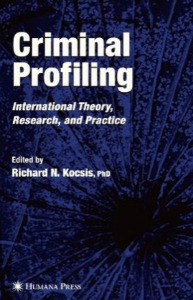
Book Description
The technique commonly referred to as ‘criminal profiling’ is one in which crime behaviours are evaluated to predict the likely attributes of an offender. In practice, the technique has enjoyed steady growth and interest over the past three decades. The present volume draws together research from scholars and practitioners from across the globe that examines from a range of multidisciplinary perspectives the use, application and value of this form of profiling.
The material canvassed throughout this text not only examines research and theoretical principles for the assessment of crimes, but extends to exploring the range of issues facing the theoretical development of criminal profiling and its practical, legal and professional practice. Topics include the examination of homicidal syndromes, the association of crime scene behavior patterns with offender characteristics, criminal propensity and opportunity, the identification of crimes committed by the same offender, the legal admissibility of profiling, its accuracy, and the problems confronting the contemporary practice of criminal profiling.
This volume is likely to become an essential reference for forensic practitioners and students alike operating in the fields of criminology, law and policing and anyone with a genuine interest in the investigation and resolution of violent crime.
See following link for more details:
Criminal Profiling: International Theory, Research, and Practice
June 2010
Behavior, Truth and Deception: Applying Profiling and Analysis to the Interview Process by Mike Napier
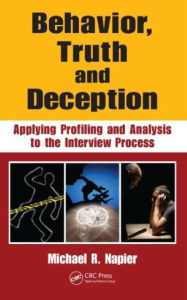
Book Description
Focusing on practical approaches for the experienced investigator, Michael R. Napier, a 27-year veteran of the FBI, presents Behavior, Truth, and Deception: Applying Profiling and Analysis to the Interview Process. This hands-on volume, drawn from years of experience interviewing suspects, reveals the targeted subject interviewing process (TSI). This technique combines all known tactics learned from criminal personality profiling and investigative analysis into an effective strategy for interviewing a suspect. The book describes the skill sets and essential elements that directly contribute to a successful interrogation and outlines an interview plan using these analytical and profiling concepts.
Topics discussed include:
A blend of insight from seasoned law enforcement professionals and behavioral experts, this fascinating volume helps investigators get under the skin of the suspect, expose deception, and bring out the truth. Employing crime scene scenarios to demonstrate concepts, the book includes a victim questionnaire capturing offender behavior, form templates, and a glossary, making this a one-stop reference for law enforcement professionals charged with solving crimes and bringing offenders to justice.
See following link for more details:
Behavior, Truth and Deception: Applying Profiling and Analysis to the Interview Process
May 2010
A Handbook for Correctional Psychologists: Guidance for the Prison Practitioner by Kevin. M. Correia
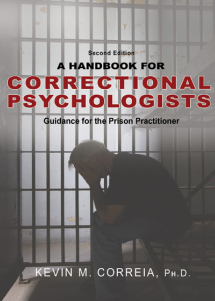
Book Description
Correctional psychology is an area of specialization that has recently enjoyed explosive growth along with the burgeoning United States prison population and the renewed interest in providing correctional rehabilitation programs that reduce inmate recidivism.
This completely revised and updated second edition continues to provide an overview of empirical findings and practices in the field. The text focuses specifically on the psychologist’s role within a correctional setting and clarifies the differences in working with inmates and correctional staff from populations more commonly encountered by those working in the field of psychology.
See following link for more details:
A Handbook for Correctional Psychologists: Guidance for the Prison Practitioner
April 2010
Learning Forensic Assessment by Rebecca Jackson
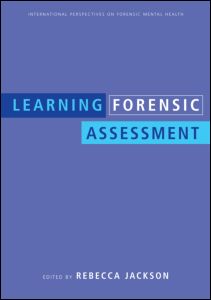
Book Description
Providing an excellent resource for forensic psychology undergraduate students, this book offers students the opportunity to learn from experts, through the collection of outstanding articles. Unlike other books in the area that are topic specific, it also gives them comprehensive coverage of the subject.
Divided into five broad topic areas, it covers:
Written by a group of internationally renowned contributors and including didactic information as well as providing discussions on practical issues regarding assessment and assessment instruments, this textbook will be invaluable reading for all students of forensic psychology.
See following link for more details:
March 2010
Evaluation of Competence to Stand Trial by Patricia Zapf & Ronald Roesch
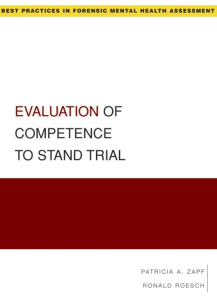
Book Description
Forensic mental health assessment (FMHA) has grown into a specialization informed by research and professional guidelines. This series presents up-to-date information on the most important and frequently conducted forms of FMHA. The 19 topical volumes address best approaches to practice for particular types of evaluation in the criminal, civil, and juvenile/family areas. Each volume contains a thorough discussion of the relevant legal and psychological concepts, followed by a step-by-step description of the assessment process from preparing for the evaluation to writing the report and testifying in court. Volumes include the following helpful features:
In making recommendations for best practice, authors consider empirical support, legal relevance, and consistency with ethical and professional standards. These volumes offer invaluable guidance for anyone involved in conducting or using forensic evaluations.
See following link for more details:
Evaluation of Competence to Stand Trial (Best Practices for Forensic Mental Health Assessment)
February 2010
Applied Criminal Psychology: A Guide to Forensic Behavioral Sciences by Richard N. Kocsis
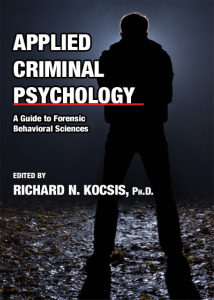
Book Description
Forensic psychology is a thriving subject with a dedicated focus beginning to emerge on the issue of crime from the discipline of psychology. Applied Criminal Psychology provides the reader with a comprehensive and practical guide to psychological research and techniques. Major topics include: (1) mental disorders and criminal behavior, antisocial behavior and personality disorders, the role of the forensic psychologist, risk and assessment; (2) the detection of deceit, eyewitness testimony, cognitive interviewing, forensic hypnosis, false confessions; and (3) criminal profiling, psychological autopsy, and crisis negotiation.
Additionally, an overview is provided of the Axis I disorders associated with criminal behavior and the Axis II or personality disorders and their specific relevance to criminal behavior. The role and assessment techniques employed by psychologists and psychiatrists and their application in the criminal justice context is examined. This book will be of special interest to psychologists, psychiatrists, criminologists, legal professionals, and law enforcement personnel throughout the world in their response to crimes and other investigative challenges.
See following link for more details:
Applied Criminal Psychology: A Guide to Forensic Behavioral Sciences
January 2010
Forensic Psychology by Jack Kitaeff
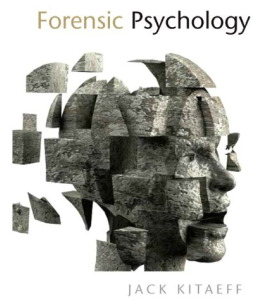
Book Description
This book presents a clear, complete picture of forensic psychology, covering both psychological and legal principles, and demonstrating their connections through actual case law and clinical examples. Dr. Jack Kitaeff first reviews the field’s history, and the roles, responsibilities, and obligations of practitioners. Next, he addresses criminological aspects of forensic psychology, examining theories of aggression and violent crime; non-violent crimes; and topics ranging from serial killing to terrorism. He thoroughly reviews forensic psychologists’ roles in law enforcement and the U.S. criminal justice system, and covers crucial issues such as repressed memories, novel syndromes, the workplace, children, families, and treatment.
See following link for more details:
December 2009
Forensic Psychology and Law by Ronald Roesh, Patricia A. Zapf & Stephen D. Hart
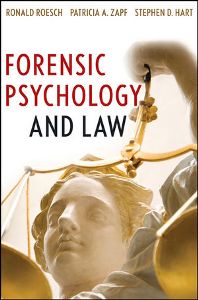
Book Description
With the growth in knowledge and expertise in forensic psychology, many students are choosing to concentrate in the area, and more established psychology professionals are entering the field every day. Focusing on the vital aspects of forensic psychology, Forensic Psychology and Law provides advanced undergraduate and graduate students with the latest theory, research, and practice in the field. The text covers such important topics as assessment, eyewitness identification, psychology of jury selection, and ethical issues.
See following link for more details:
November 2009
Investigative Psychology: Offender Profiling and the Analysis of Criminal Action by David Canter & Donna Youngs
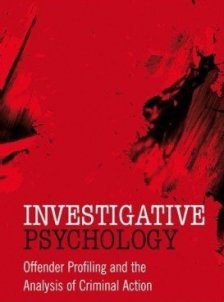
Book Description
This ground-breaking text is the first to provide a detailed overview of Investigative Psychology, from the earliest work through to recent studies, including descriptions of previously unpublished internal reports. Crucially it provides a framework for students to explore this exciting terrain, combining Narrative Theory and an Action Systems framework. It includes empirically tested models for Offender Profiling and guidance for investigations, as well as an agenda for research in Investigative Psychology.
Investigative Psychology features:
The full range of crimes from fraud to terrorism, including burglary, serial killing, arson, rape, and organised crime.
Important methodologies including multi-dimensional scaling and the Radex approach as well as Social Network Analysis.
Geographical Offender Profiling, supported by detailed analysis of the underlying psychological processes that make this such a valuable investigative decision support tool.
The full range of investigative activities, including effective information collection, detecting deception and the development of decision support systems.
In effect, this text introduces an exciting new paradigm for a wide range of psychological contributions to all forms of investigation within and outside of law enforcement. Each chapter has actual cases and quotations from offenders and ends with questions for discussion and research, making this a valuable text for undergraduate and postgraduate courses in Applied and Forensic Psychology, Criminology, Socio-Legal Studies and related disciplines.
See following link for more details:
Investigative Psychology: Offender Profiling and the Analysis of Criminal Action
October 2009
Interrogations and Disputed Confessions: A Manual for Forensic Psychological Practice by Gregory DeClue
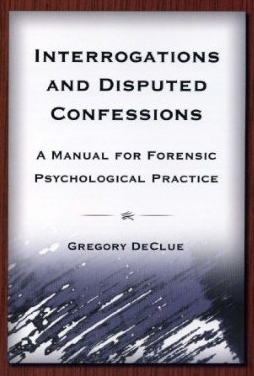
Book Review by Joel A. Dvoskin, PhD, ABPP, (Diplomate in Forensic Psychology)
Dr. DeClue has cleverly woven relevant wisdom from history, psychology, law, and criminal justice. This remarkably readable book is simple enough for any intelligent citizen to understand, clear enough to advise any police officer, and at the same time sophisticated enough for the most advanced police administrator, criminal lawyer, or forensic psychologist. This is an exceptional accomplishment.
See following link for more details:
Interrogations and Disputed Confessions: A Manual for Forensic Psychological Practice
September 2009
Personality, Personality Disorder and Violence: An Evidence Based Approach by Mary McMurran & Richard Howard
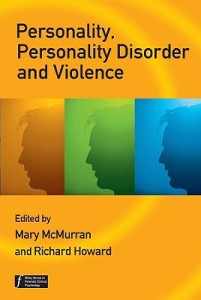
Book Description
New in the Wiley Series in Forensic Clinical Psychology, Personality, Personality Disorder and Violence takes an evidence-based look at personality traits and types of psychological functioning that may contribute to personality disorder and violence, and the connections that lie between them.
Each chapter tackles a specific area of personality or psychological functioning and is theoretically based, including a developmental perspective, discussion of what should be assessed for gauging risk and evaluating risk reduction, and an outline of effective treatments.
Personality traits covered include impulsivity, aggressiveness, narcissism, and The Big Five (neuroticism, extraversion, openness, agreeableness and conscientiousness). Psychological functioning analysis includes neuroaffective processing, emotion recognition and empathy deficits. The book concludes with implications for research and practice.
See following link for more details:
August 2009
Expert Testimony on the Psychology of Eyewitness Identification by Brian L. Cutler
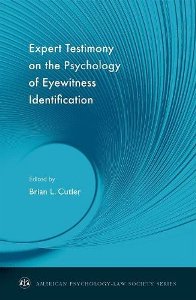
Book Description
Eyewitness testimony is highly compelling in a criminal trial, and can have an indelible impact on jurors. However, two decades of research on the subject have shown us that eyewitnesses are sometimes wrong, even when they are highly confident that they are making correct identifications. This book brings together an impressive group of researchers and practicing attorneys to provide current overviews and critiques of key topics in eyewitness testimony.
See following link for more details:
Expert Testimony on the Psychology of Eyewitness Identification
July 2009
Evaluation of Criminal Responsibility (Best Practices in Forensic Mental Health Assessment) by Ira K. Packer
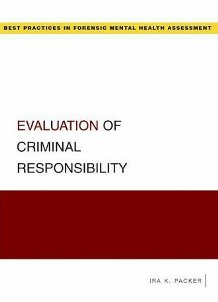
Book Description
Contains a thorough discusson of the relevant legal and psychological concepts, followed by a step-by-step description of the assessment process from preparing for the evaluation to writing the report and testifying in court.
See following link for more details:
Evaluation of Criminal Responsibility (Best Practices in Forensic Mental Health Assessment)
June 2009
The Art and Science of Child Custody Evaluations by Jonathan W. Gould & David A. Martindale
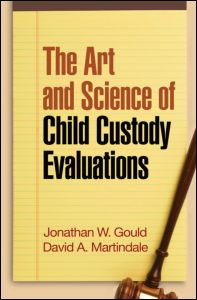
Book Description
Addressing key topics in child custody evaluation, this book provides essential knowledge for practitioners who want to meet the highest standards for both scientific validity and legal admissibility. The authors are leading experts who describe the latest data-based approaches to understanding and assessing relevant child, parent, and family factors.
Going beyond the basics, the book gives in-depth attention to challenging, frequently encountered issues, such as how to evaluate allegations of domestic violence, child sexual abuse, and child alienation. Also covered are the complexities of interviewing children effectively and working in the adversarial forensic context. A user-friendly appendix contains sample letters and statements of understanding, with permission to photocopy.
See following link for more details:
The Art and Science of Child Custody Evaluations
May 2009
Principles and Practice of Trial Consultation by Stanley L. Brodsky
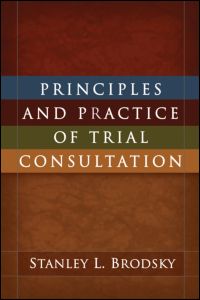
Book Description
A pragmatic guide to a growing area of professional practice, this book describes the multiple roles of the trial consultant and provides tools for carrying them out competently and ethically. Leading authority Stanley Brodsky uses examples from actual trials and depositions to illustrate how knowledge and skills from psychology and related fields are applied in the legal context.
Brodsky shows how to use scientific methods and findings to assist with jury selection, help attorneys focus their arguments, prepare witnesses for the rigors of cross-examination, and conduct change of venue evaluations. The examples are drawn from a wide range of civil and criminal cases. In addition to behavioral scientists, legal professionals also will find important insights and strategies in this book.
See following link for more details:
Principles and Practice of Trial Consultation
April 2009
Dictionary of Forensic Psychology by Graham J. Towl, David P. Farrington, David A. Crighton & Gareth Hughes

Book Description
Over the past decade forensic psychology has grown rapidly as a subject, with an increasing number of forensic psychologists under training and working in demanding roles in prisons, secure training facilities, and high, medium and low security healthcare facilities as well as other parts of the criminal justice system.This "Dictionary" is part of a new series of "Dictionaries" covering key aspects of criminal justice and the criminal justice system, designed to meet the needs of both students and practitioners.
It contains approximately 300 entries (of between 500 and 1500 words) on key terms and concepts arranged alphabetically. These entries are contributed by leading academic and practising forensic psychologists. It is designed to meet the needs of both students and practitioners. The entries includes summary definition, main text and key texts and sources takes full account of the criteria and syllabus for the BPS-approved Diploma in Forensic Psychology and MSc in Forensic Psychology. The book is edited by leading authorities in the forensic psychology field.
See following link for more details:
Dictionary of Forensic Psychology
March 2009
Forensic Uses of Clinical Assessment Instruments by Robert P. Archer
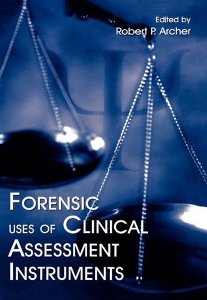
Book Description
The purpose of this book is to provide a firm basis for psychologists to understand the appropriate uses and limitations of popular clinical assessment measures as they are applied to forensic issues. The instruments were selected because of their wide use and importance in both clinical and forensic settings. The PCL-R, the PAI, and MCMI-II, for example, are typically used with adults in criminal evaluations; the MMPI-A is often used in evaluating adolescents in detention and correctional facilities; while the Child Behavior Checklist (CBCL) (Achenbach, 1991), Personality Inventory for Children—Second Edition (PIC-2) (Lachar & Gruber, 2001), and Parenting Stress Index (PSI) (Abidin, 1995) are more commonly used in evaluating families involved in child protection and custody cases. Instruments such as the MMPI-2, the Rorschach, and the Halstead-Reitan Neuropsychological Battery are widely used across many types of forensic evaluations, although the latter category of testing is particularly related to personal injury evaluations.
The end result is a unique and indispensable reference: a comprehensive overview, within a single text, of prominent clinical assessment instruments widely used for forensic purposes and designed to facilitate the optimal use of clinical assessment instruments among psychologists who have undertaken the training necessary to understand and apply psychological principles and test findings to salient legal standards or issues.
See following link for more details:
Forensic Uses of Clinical Assessment Instruments
February 2009
Personal Construct Perspectives on Forensic Psychology by James Horley
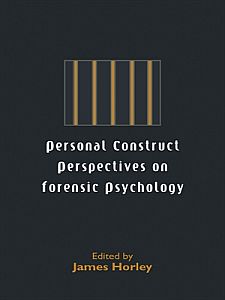
Book Description
Why do people commit violent offences? Does rehabilitation really work?
Personal Construct Perspectives on Forensic Psychology provides a new approach to the three main areas of application of forensic psychology: rehabilitation of offenders, work with police, and research and consultation on legal issues and processes. Challenging the mainstream approach to viewing offenders, this book emphasizes responsibility for life choices, and eschews the biomedical view of people.
Practicing psychologists share their perspectives and illustrate their discussion with case studies and personal research. Reviewing relevant literature in many substantive areas including violent, sexual, and mentally disordered offenders, working with police stress, and treating offenders in prison, these outstanding authors make a strong argument from a personal construct perspective. In an area of increasing interest Personal Construct Perspectives on Forensic Psychology provides a solid background for further growth. Forensic practitioners, theorists and researchers alike will all benefit from the books many insights and clinical tips.
See following link for more details:
Personal Construct Perspectives on Forensic Psychology
January 2009
The MMPI, MMPI-2 & MMPI-A in Court: A Practical Guide for Expert Witnesses and Attorneys by Kenneth S. Pope, James N. Butcher & Joyce Seelen
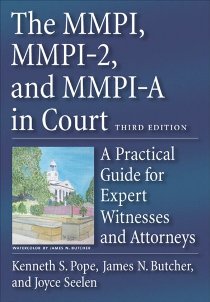
Book Description
The 3rd Edition of "The MMPI, MMPI-2, and MMPI-A in Court: A Practical Guide for Expert Witnesses and Attorneys" is an updated and expanded edition of the best-selling "Pope-Butcher-Seelen" volume. Like the previous edition, this book is written in an engaging and accessible style. Reviewing the three versions of the MMPI, the empirical research identifying the MMPI's effectiveness and limitations in different kinds of civil and criminal forensic assessments and with different populations, and the courts' recognition and restriction of MMPI-based testimony, it provides comprehensive guidance to both novice and experienced professionals.
The book covers the practical steps of trial preparation and courtroom work, such as choosing appropriate assessment measures, crafting an effective subpoena duces tecum, preparing for depositions, handling Daubert challenges, and communicating with the jury. It prepares expert witnesses and attorneys to address complex issues regarding validity, reliability, sensitivity, specificity, base rates, and malingering, and to avoid common psychometric, logical, and practical pitfalls. The 26 appendices gather under one cover the key resources that expert witnesses and attorneys can rely on during preparation and take with them to depositions and trial.
See following link for more details:
The MMPI, MMPI-2 & MMPI-A in Court: A Practical Guide for Expert Witnesses and Attorneys
December 2008
Trials of a Forensic Psychologist: A Casebook by Charles Patrick Ewing
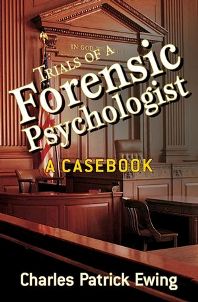
Book Description
A fascinating collection of ten high–profile cases illustrating the controversial, often contentious–yet essential–role of forensic psychology in the American justice system
Written by psychologist and lawyer Charles Patrick Ewing, one of the country′s leading experts on forensic psychology, Trials of a Forensic Psychologist: A Casebook is a scholarly, thought–provoking collection of cases from the author′s three decades of professional experience. Bringing to life the psychological and legal details of each case as well as the personal stories involved, this volume insightfully covers those issues facing forensic psychologists, including:
Ability to Waive Miranda Rights Coerced Confessions The Insanity Defense Malingering Battered Woman Syndrome Evaluating Allegations of Child Sexual Abuse The Implications of Extreme Emotional Disturbance
Informative, compelling, and educational, each of the ten cases presented in Trials of a Forensic Psychologist: A Casebook offers a rare glimpse at the work of forensic psychologists, how forensic psychologists are examined in court, the ways in which their expertise is used by the legal system, and the contributions they make to the system′s ultimate goal of doing justice.
See following link for more details:
Trials of a Forensic Psychologist: A Casebook
November 2008
Forensic Psychology by Matthew T. Huss

Book Description
Forensic Psychology provides students with an in-depth and insightful introduction to the clinical practice of forensic psychology. Incorporating two main themes, scope of practice and therapeutic jurisprudence, the text focuses on empirically supported clinical practice and exposes students to case law and statutory law necessary in the practice of forensic psychology.
The text utilizes real world examples that help students understand the practical applications of forensic psychology. It encourages an understanding of the law as a living and breathing entity, examining its ability to be therapeutic or anti-therapeutic to the people impacted by it. Accessible and user-friendly, this text provides students with a thorough introduction to the field.
See following link for more details:
October 2008
Evolutionary Forensic Psychology by Joshua Duntley & Todd K. Shackelford
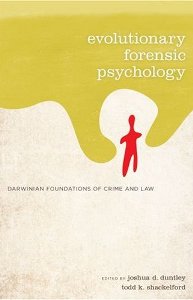
Book Description
The field of forensic psychology explores the intersection of psychology and the law. The purpose of this book is to examine topics in the field using the powerful, multidisciplinary, conceptually integrated approach that the natural sciences have embraced for decades with great success.
Darwin's theory of evolution by natural selection is the meta-theoretical framework that unifies the field of biology. It unites research and understanding of the development, control, and organization of behavior. The study of humans, which includes all of the social sciences, is part of the field of biology. Darwin's theory provides a powerful meta-theoretical framework that can unify and energize forensic psychology, just as it has the biological sciences.
Natural selection is the only known process capable of shaping complex functional mechanisms. Just as it shaped physiological adaptations with specific problem-solving functions, it also shaped our thoughts and emotions to guide behaviors toward solving recurrent problems of survival and reproduction. With this logic, we can use knowledge of ancestral problems to guide our understanding of how the mind works.
Evolutionary Forensic Psychology is a necessary step toward a unified and complete understanding of psychology and the law. It recognizes that crimes such as murder, non-lethal violence, rape, and theft are manifestations of evolutionarily recurrent selection when they gave individuals an advantage in competition for resources. Each of the chapters that comprise this volume has been selected to provide the first unified examination of important research contributions and future directions of Evolutionary Forensic Psychology.
See following link for more details:
Evolutionary Forensic Psychology
September 2008
Forensic Psychology by Graham M. Davies, Clive R. Hollin & Ray Bull
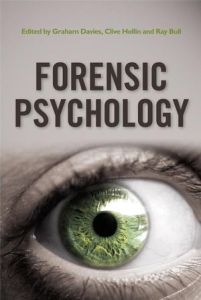
Book Description
Forensic psychology is one of the fastest growing areas of applied psychology. Embracing both Criminological and Legal Psychology, it is concerned not only with how and why crime is committed but also with the investigation, detection and prosecution of offenders and their punishment an rehabilitation.
Forensic Psychology is both broad enough to give comprehensive coverage and detailed enough to do justice to each aspect of this evolving field. The highly experienced editors have selected a team of authors to provide a cohesive teaching resource that is up-to-date and easy to use.
The text is divided into four parts:
The Anatomy of Crime covers definitions and measurements as well as theories of why crime is committed.
Investigating Crime includes interviewing victims, witnesses and suspects, detecting deception and identifying perpetrators.
The Trial Process offers detailed coverage of judicial processes, safeguarding witnesses, evidence, and the role of experts in a number of contexts.
After Sentencing includes a discussion of the role of sentencing and therapeutic work with offenders.
Forensic Psychology is essential reading for all undergraduate courses in forensic psychology and an excellent introduction for more detailed postgraduate courses.
See following link for more details:
August 2008
Principles of Geographical Offender Profiling by David Canter & Donna Youngs
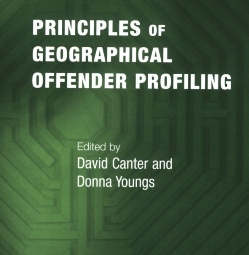
Book Description
Geographical Offender Profiling (GOP) is the term that has emerged for the examination of where offences take place and the use of that examination to formulate views on the nature of the offender and where s/he might be based. As such, it has become the cornerstone of 'offender profiling'. By its nature, GOP bridges psychology, geography, criminology and forensic science and is of academic interest to all those disciplines as well as practical significance to police investigators.
This book brings together a cross-section of the major papers published in the field that lay out the concepts and foundations of this area - including some widely quoted but difficult to obtain 'classic' papers - with an introduction that puts the papers into an overall context and a concluding extensive bibliography of the publications relevant to this rapidly growing area.
See following link for more details:
Principles of Geographical Offender Profiling (Psychology, Crime and Law)
July 2008
Psychological Evaluations for the Courts by Gary B. Melton et al
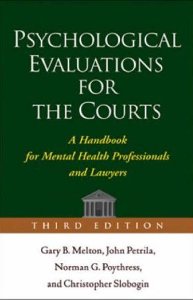
Editorial Review by Stephen D. Hart, PhD, Dept. of Psychology, Simon Fraser University
The release of the third edition of Psychological Evaluations for the Courts will ensure it remains the authoritative reference in the field for years to come. This is a truly indispensable volume that both embodies and establishes the state of the discipline. Its breadth of coverage is unmatched by any other book, and each topic is analyzed critically and in exacting detail.
The quality of psycholegal scholarship is, quite simply, awesome. For educators, this book can serve as the single required text for virtually any graduate or postgraduate training program in forensic psychology. It is also an excellent practice guide for those already working in the field.
See following link for more details:
June 2008
Psychological Injuries: Forensic Assessment, Treatment, and Law by William J. Koch et al
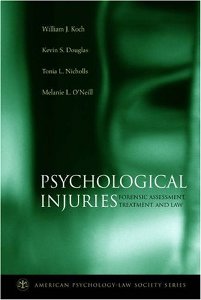
Book Description
Human emotional suffering has been studied for centuries, but the significance of psychological injuries within legal contexts has only recently been recognized. As the public becomes increasingly aware of the ways in which mental health affects physical and financial well-being, psychological injuries comprise a rapidly growing set of personal injury insurance claims.
Although the diverse range of problems that people claim to suffer from are serious and often genuine, the largely subjective and unobservable nature of psychological conditions has led to much skepticism about the authenticity of psychological injury claims. Improved assessment methods and research on the economic and physical health consequences of psychological distress has resulted in exponential growth in the litigation related to such conditions.
Integrating the history of psychological injuries both from legal and mental health perspectives, this book offers compelling discussions of relevant statutory and case law. Focussing especially on posttraumatic stress disorder, it addresses the current status and empirical limitations of forensic assessments of psychological injuries and alerts readers to common vulnerabilities in expert evidence from mental health professionals. In addition, it also uses the latest empirical research to provide the best forensic methods for assessing both clinical conditions such as posttraumatic stress disorder and for alternative explanations such as malingering.
The authors offer state-of-the-art information on early intervention, psychological therapies, and pharmaceutical treatments for posttraumatic stress disorder and stimulating suggestions for further research into this complex phenomenon. A comprehensive guide to psychological injuries, this book will be an indispensable resource for all mental health practitioners, researchers, and legal professionals who work with psychological injuries.
See following link for more details:
May 2008
Clinical Assessment of Malingering and Deception, Third Edition by Richard Rogers
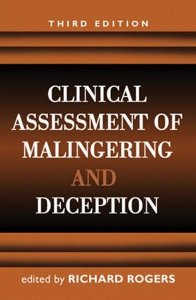
Book Description
Widely regarded as the standard reference in the field, this book, now in its third edition, provides essential tools for understanding and assessing malingering and other response styles in forensic and clinical contexts.
An integrating theme for the substantially expanded third edition is the systematic application of detection strategies as conceptually grounded, empirically validated methods that bridge different measures and populations. From leading practitioners and researchers, the volume presents major theoretical, empirical, and clinical advances. Coverage of multiscale inventories and feigned cognitive impairment has been doubled, and new chapter topics include feigned medical presentations, factitious disorders, and forensic evaluations.
See following link for more details:
Clinical Assessment of Malingering and Deception, Third Edition
April 2008
Wrightsman's Psychology and the Legal System by Edith Greene, Kirk Heilbrun, William H. Fortune & Michael T. Nietzel
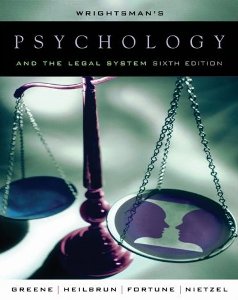
Book Description
The author team for WRIGHTSMAN'S PSYCHOLOGY AND THE LEGAL SYSTEM, Sixth Edition combines complementary expertise, active research, writing careers, and real world experience (as consultants working within the legal system) to produce a comprehensive text that is unparalleled in scholarship and writing style. The authorship, research base and comprehensive coverage make this text popular with instructors and students.
This text demonstrates the importance of psychology to understanding the legal system and the impact on individuals' everyday lives through the use of real cases and questions formed to create discussions of these cases.
See following link for more details:
Wrightsman's Psychology and the Legal System
March 2008
Insanity: Murder, Madness, and the Law by Charles Patrick Ewing
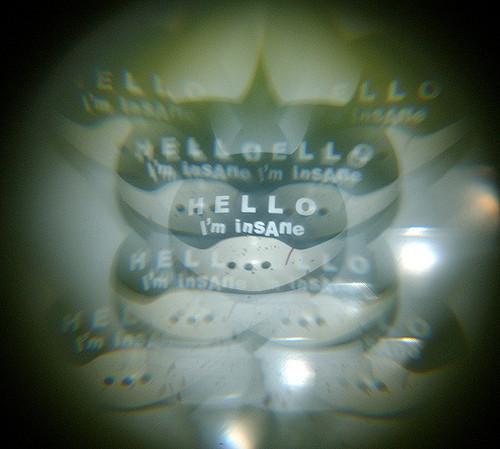
Book Description
In this book, Professor Ewing tackles the most complex of all legal/psychological issues: the insanity defense. It has been employed thousands of times, but there is still little understanding by lawyers and psychologists of its proper use.
By analyzing some of the most well-known insanity cases in legal history, this book sheds light on the particularities of this defense; when it is successful, and when it is a sham. The casebook is an established format in which to illuminate legal questions, and yet no such book exists yet for this topic. Professor Ewing will examine 20 of the most influential and controversial insanity cases, from the recent D.C. sniper trial to Jack Ruby's failed plea in his trial for the assassination of Lee Harvey Oswald.
The cases are all carefully chosen to illuminate different ways in which the courts have handled this defense. Throughout, the author will add his own analysis of the cases and the reasons for the verdict. This book will be an excellent introduction to the subject for students of law or forensic psychology, and a concise overview of the issues at stake for professionals in the field.
See following link for more details:
Insanity: Murder, Madness, and the Law
February 2008
Ethical Practice in Forensic Psychology: A Systematic Model for Decision Making by Shane S. Bush, Mary A. Connell & Robert L. Denney

Book Description
While most psychologists working in forensic contexts aspire to practice in a manner consistent with the highest ideals of ethical practice, they face numerous and complex concerns and may be unclear about how to apply the Ethics Code and Specialty Guidelines for Forensic Psychologists to their real-world issues.
In Ethical Practice in Forensic Psychology, Shane S. Bush, Mary A. Connell, and Robert L. Denney explore common ethical dilemmas forensic psychologists may encounter in procedures including referrals, evaluations, documentation of findings and opinions, and testimony and termination. The authors present and apply a practical ethical-decision making model to timely case vignettes in the areas of civil, criminal, and child/family law to demonstrate how to approach the ethical challenges faced in forensic psychology; they also offer suggestions for addressing potential ethical misconduct by colleagues.
This balanced and comprehensive volume will be a valuable addition to the library of forensic psychology students and trainees, and career forensic psychologists.
See following link for more details:
Ethical Practice in Forensic Psychology: A Systematic Model for Decision Making
Visitors From The UK Click Here
January 2008
Beyond Common Sense: Psychological Science in the Courtroom Edited by Eugene Borgida & Susan T. Fiske

Book Description
Beyond Common Sense addresses the many important and controversial issues that arise from the use of psychological and social science in the courtroom.
Features original chapters written by some of the leading experts in the field of psychology and law including Elizabeth Loftus, Saul Kassin, Faye Crosby, Alice Eagly, Gary Wells, Louise Fitzgerald, Craig Anderson, and Phoebe Ellsworth.
Each chapter identifies areas of scientific agreement and disagreement, and discusses how psychological science advances an understanding of human behavior beyond what is accessible by common sense. The issues addressed include eyewitness identification, gender stereotypes, repressed memories, Affirmative Action, and the death penalty.
Commentaries written by 7 leading social science and law scholars discuss key legal and scientific themes that emerge from the science chapters and illustrate how psychological science is or can be used in the courts
For more details and/or to get hold of this recommended forensic psychology book, just click on the following link.
Beyond Common Sense: Psychological Science in the Courtroom
December 2007
Applying Psychology to Criminal Justice by David Carson et al

Book Description
This essential volume, edited by four psychologists and a lawyer, argues that psychology can, and should be, applied more widely, particularly within the criminal justice system.
Psychology and Law has made enormous strides during the last three decades. It now incorporates a much wider range of topics and has seen a marked international growth in specialist journals, books and conferences. The focus, until now, has been on research and academic membership rather than on practical applications and participation by practitioners, psychologists or lawyers, something this volume aims to change.
This book develops the case for successfully applying psychology to law, and criminal justice in particular, by providing a rich range of applicable examples for development, now and in the future. In Applying Psychology to Criminal Justice psychologists are encouraged to challenge the currently relatively limited ambition and imagination of psychology and law by examining, amongst other aspects:
This text is an important addition to the bookshelves of forensic, legal, clinical, and occupational psychologists, students, and criminal justice personnel: police, probation, prisons. Also essential reading for investigators, lawyers, law reform agencies, and those government departments concerned with home, constitutional, law reform agendas.
See following link for more details:
Applying Psychology to Criminal Justice
November 2007
Personality-Guided Forensic Psychology by Robert J. Craig

Book Description
In Personality-Guided Forensic Psychology, Robert J. Craig discusses the hot area of forensic psychology, the crossroads of law and psychology, and illustrates how personality-guided assessment is a useful tool in the multiple arenas in which forensic psychologists are active: child custody evaluation, fitness for duty evaluations, personal injury, domestic violence, and many others. The volume begins with an overview of forensic psychology and the personality theories most relevant to forensic psychology. Chapters cover assessments ranging from relatively normal evaluations (police applicants and officers, custody and personal injury) to those in which severe pathology may come into play (domestic violence and homicide).
The book offers a wealth of data on personality-test scores of chronic pain patients, patients who litigate, those who commit sexual or other physical abuse or murder, and others. Psychologists who serve as expert witnesses of friends of the court in legal proceedings, those choosing candidates for intervention programs, and students of forensic psychology will find this book indispensable. Volumes in the Personality-Guided Psychology series demonstrate the utility and relevance of assessing personality variables in an array of matters of interest to psychologists. Each book illustrates how a clinical syndrome or behavior can be understood in the context of the patient's unique pattern of overall trait dynamics.
For more details and/or to get hold of this recommended forensic psychology book, just click on the following link.
Personality-Guided Forensic Psychology (Personality Guided Psychology)
October 2007
Psychology and Law: An Empirical Perspective by Neil Brewer & Kipling D. Williams
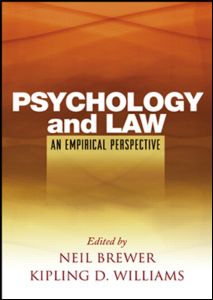
Book Description
From the initial investigation of a crime to the sentencing of an offender, many everyday practices within the criminal justice system involve complex psychological processes. This volume analyzes the processes involved in such tasks as interviewing witnesses, detecting deception, and eliciting eyewitness reports and identification from adults and children. Factors that influence decision making by jurors and judges are examined as well. Throughout, findings from experimental research are translated into clear recommendations for improving the quality of evidence and the fairness of investigative and legal proceedings. The book also addresses salient methodological questions and identifies key directions for future investigation. See following link for full details.
See following link for more details:
Psychology and Law: An Empirical Perspective
Visitors From The UK Click Here
September 2007
Forensic Psychology: Emerging Topics and Expanding Roles by Alan M. Goldstein

Book Description
Forensic Psychology: Emerging Topics and Expanding Roles is designed to present the current state of the field, in terms of law, ethics, research and practice. Reflecting the efforts of almost 50 expert contributors, this comprehensive reference provides a basis for conducting forensic mental health assessments consistent with the state of the field as it currently exists and the standard of care that is emerging.
This must-have resource contains a coverage of: mainstream topics such as civil commitment, termination of parental rights, and federal sentencing evaluations, psycho-legal topics such as clergy and teacher sexual abuse, elder abuse, and end of life issues; the appropriate application of instruments frequently used in clinical psychology to address psycho-legal issues.
Ideal for forensic mental health professionals, civil and criminal attorneys, and advanced students, "Forensic Psychology: Emerging Topics and Expanding Roles" is the definitive comprehensive reference in the field. "Alan Goldstein has his finger on the pulse of forensic psychology. He and his A-list contributors showcase a striking array of classic conundrums and budding courtroom controversies. Remarkably, their analysis is as deep as their coverage is broad. There are two or three works that simply have to be on the shelf of every forensic psychologist. This book is one of them."
See following link for more details:
Forensic Psychology: Emerging Topics and Expanding Roles
Visitors From The UK Click Here
August 2007
Adoption: Uncharted Waters by by David Kirschner

Book Description & Excerpt
In Adoption: Uncharted Waters, renowned psychologist David Kirschner, Ph.D., opens his case files showing the connection between adoption and murder. Kirschner has prepared psychological evaluations of numerous murderers, including "Casino Killer" Jeremy Strohmeyer, serial wife-and-mother poisoner Steve Catlin, and New York's most prolific serial killer, Joel Rifkin. There's also an in-depth chapter on adoptee and multiple murderer David Berkowitz -- the infamous "Son of Sam."
The author takes no prisoners in telling his side of these famous cases. He rips into Dr. Barbara Kirwin, the defense witness who botched the Rifkin case, and slams famous attorney Alan Dershowitz, whose book "The Abuse Excuse" attacked Kirschner's "Adopted Child Syndrome."
"Adoption is a lifelong process, not a one-time event," says the author, a staunch advocate of opening birth records, which he sees as a human and civil right of adoptees. Kirschner shows how secrecy, lies, and sealed records can lead adoptees into a fantasy life that sometimes explodes in deadly rage.
The excerpt below describes the author's first encounter with Joel Rifkin, New York's most prolific serial killer.
My First Encounter With Serial Killer Joel Rifkin by David Kirschner, Ph.D.
With [Joel] Rifkin in custody and the number of murders he confessed to mounting [17 in all], the police knew that a media circus was in the offing when the doors were flung open to the press. It was not often that they had in tow a suspect who was confessing to crimes faster than they could count them, and so they were eager to keep the press at bay for as long as possible.
However, Jeanne Rifkin, [Joel's adoptive mother], knew that something was amiss when she arrived home at around three o'clock that afternoon and found policemen swarming all over her yard and around her house. When she learned the reason for their presence, she phoned her estate lawyer, who then called Robert Sale, a highly regarded defense attorney.
Sale notified the police and the district attorney's office that he was representing Rifkin and that all questioning was to cease immediately. He advised Jeanne that police would soon be arriving with a search warrant and she would have to let them look for evidence in any area of the house that was used or shared by Joel. He told his client that Joel was scheduled for an arraignment the following morning in Hempstead District Court. He would be charged with the second-degree murder of Tiffany Bresciani. Other charges would follow in Suffolk County and in other jurisdictions.
Rifkin was finally paraded before the press that night when he was led from the station house to his jail cell. More than one reporter would note that he looked none the part of a maniacal serial killer. He did not have the crazed look in his eye of the Unabomber or Oklahoma City bombers or the overgrown beard and unruly mane of a Charles Manson. Even in his hooded jump suit, wearing chains on his feet and his hands manacled, Joel Rifkin looked like a shy, tight lipped accountant with his neat little mustache and broad, gold rimmed glasses.
At the same time, police who were searching the Rifkin home turned up a large collection of mementos he had assembled to commemorate his conquests, items such as lace panties, pantyhose, lipstick containers, bracelets, and necklaces that were taken from the bodies of his victims.
Not surprisingly, given his confession and the abundance of physical evidence that had been collected, Rifkin's attorney decided to go for an insanity defense. With his down-home kind of country style and low-key manner, Sale had been there before. He had won an acquittal by reason of insanity of a man who had killed and dismembered his wife and three children with a bayonet. He had also won a number of other difficult cases, including a successful entrapment defense for a New York City police officer and his brother who were caught as they tried to pull off an armed robbery, and the dismissal of armed robbery charges for Malcolm X's bodyguards.
Sale had spent eight years at the Legal Aid Society in Nassau County, during which time he put together a string of sixteen straight trial victories, a feat that has never been equaled, according to a senior trial lawyer with the society. He was elevated to bureau chief in charge of felony cases at Legal Aid before entering private practice. He would need all of that and a bit more in defense of Rifkin, however, for no serial killer had ever been found not guilty by reason of insanity.
Preparing Rifkin's Insanity Defense
I first read about the Rifkin case while I was on vacation in Sante Fe. It captured my attention because Rifkin was precisely the type of subject -- an adoptee killer -- I had been studying and he came from my immediate Long Island neighborhood. Soon after I returned from Sante Fe, Sale contacted me, told me of his plans to mount an insanity defense, and gave me psychological reports from Joel's childhood and teenage years in East Meadow.
Early in my career I had worked in the East Meadow school district, and two of the reports Sale gave me were written by close friends and school psychologists I had worked with -- Edna Dublirer in the junior high school and Norm Pollens in the high school. I was especially interested to note that both reports stated that Joel had been troubled by memory problems, a finding that could be crucial to an insanity defense based on dissociative identity disorder, commonly referred to as multiple personality.
During my discussions with Sale, I also discovered that I knew the psychotherapist, Joseph Nemovicher, who had treated Joel in twenty-five sessions from May 1977 to January 1979. As it developed, Nemovicher had documented Joel's learning difficulties and memory problems but had never considered the effects of adoption on his psychological profile.
In my first face-to-face meeting with Sale (which, as it turned out, would also be my last) I told him that the reports from Joel's school psychologist would be valuable in supporting his defense strategy since they documented a pre-existing childhood history of emotional disturbance, mental illness, and severe memory loss. I also suggested getting additional reports from neurologists that might reveal some organic brain condition that could contribute to a mental-status defense. Most critically I recommended that we begin a search for his birth mother immediately.
A genetic predisposition toward violence has been documented with growing authority by a number of researchers, most notably Dr. Sarnoff Mednick, who has been studying the relationship between adoption, genetics, criminality, and violence in Denmark, where precise and thorough adoption records are kept.
I made arrangements to meet with Joel and do a thorough psychological evaluation. Over the course of the next twenty months we met for more than 110 hours, and the result was perhaps the most complete psychological profile of a serial killer ever developed.
My First Meeting With Rifkin
My first meeting with Joel took place on September 9, 1993, just over two months after his arrest. His recollection of events and how he felt was still fresh at that time, uncolored by subsequent tellings and retellings, by accounts rendered by others involved in the case, and perhaps by suggestions of how to frame his story for the optimum legal effect. I met with him in the Nassau County Correctional Center (NCCC) just a few blocks from his alma mater, East Meadow High School. Coincidentally, East Meadow High is the school district where I had worked as a young psychologist.
A maximum security institution, NCCC was a forbidding granite structure that had recently been enlarged, renovated and modernized so that it now looked like a high tech control center with banks of TV monitors and video cameras recording every move in every corridor. When I walked through the thick steel front door, I was asked to present my credentials and authorization letter from an attorney. The correction officers on duty had me empty my pockets, searched me with metal detectors, and finally led me through a maze of corridors. As each metal door clanged shut behind me I felt a sense of foreboding that it might be easier to enter than it would be to exit.
My destination was a small cubicle, eight-by-eight feet, that was glass enclosed and looked out onto a large, central visitors' area where prisoners met with their families. I waited for about ten minutes, seated at a small metal table, with a writing pad open to take notes as we talked. Finally Rifkin was brought in.
Rifkin initially appeared to be timid, passive, and somewhat distracted as he sat across from me, looking down or off into space, rarely making eye contact. He was, however, not at all shy about talking. It was apparent that he enjoyed being the center of attention, people hanging on his every word. In fact, Rifkin's problem was not talking, but listening. As our sessions continued, I would often say to him, "Joel, shut up and listen for a change."
What struck me most about him in that first meeting was the *duality* of his nature, abruptly shifting from a timid, passive, nonagressive type to an assertive, egocentric, grandiose personality. I was also interested to note his failure to display any real emotion. He never came across as angry or hostile, and certainly not as violent. Even when he described the seventeen gory "events," as he referred to them, he showed no emotion -- neither rage nor regret nor remorse. It was as if he were describing acts committed by someone other than himself.
Copyright ©2007 by David Kirschner. All Rights Reserved.
See following link for more details:
Visitors From The UK Click Here
July 2007
The Criminal Mind: A Writer's Guide to Forensic Psychology by Katherine Ramsland

Editorial Review by David Pitt From Booklist
An extremely informative, very useful guide to understanding and writing about forensic psychology. Many writers, the author suggests, write about forensic psychologists without really appreciating what they do or how they do it. The author cites numerous examples from fiction to illustrate her points, showing how Thomas Harris made things seem a little too slick in The Silence of the Lambs or how James Patterson misunderstood some fundamentals in Along Came a Spider. She also uses several well known cases histories; Charles Starkweather, Lizzie Borden, Dan White, to illustrate various psychological disorders and their diagnoses.
Aspiring thriller writers should pay particular attention to the discussion of the relationship between psychology and the law, including the nature of insanity defenses and the treatment of offenders. Ramsland's mixture of fact and fiction is extremely helpful: she begins a discussion with something we recognize, like an episode from Law & Order, and then segues gently into more unfamiliar territory. The book gives budding writers, and anyone else with an interest in this subject, a solid grounding in the history, terminology, and techniques of forensic psychology.
See following link for more details:
The Criminal Mind: A Writer's Guide to Forensic Psychology
Visitors From The UK Click Here
June 2007
Evaluating Competencies: Forensic Assessments & Instruments by Thomas Grisso

Book Description
This book offers a conceptual model for understanding the nature of legal competencies. The model is interpreted to assist mental health professionals in designing and performing assessments for legal competencies defined in criminal and civil law, and to guide research that will improve the practice of evaluations for legal competencies.
A special feature is the book's evaluative review of specialized forensic assessment instruments. Application of the assessment model and reviews of instruments are provided for six areas of legal competence:
See following link for more details:
Evaluating Competencies: Forensic Assessments and Instruments (Perspectives in Law & Psychology)
Visitors From The UK Click Here
May 2007
Geographic Profiling by Kim Rossmo

Book Description
As any police officer who has ever walked a beat or worked a crime scene knows, the street has its hot spots, patterns, and rhythms: drug dealers work their markets, prostitutes stroll their favorite corners, and burglars hit their favorite neighborhoods. But putting all the geographic information together in cases of serial violent crime (murder, rape, arson, bombing, and robbery) is highly challenging. Just ask the homicide detectives of the Los Angeles Police Department who hunted the Hillside Stranglers, or law enforcement officers in Louisiana who tracked the brutal South Side rapist.
Geographic Profiling introduces and explains this cutting-edge investigative methodology in-depth. Used to analyze the locations of a connected series of crimes to determine the most likely area of offender residence, geographic profiling allows investigators and law enforcement officers to more effectively manage information and focus their investigations.
This extensive and exhaustive work explains geographic profiling theories and principles, and includes an extensive review of the literature and research in the areas of criminal profiling, forensic behavioral science, serial violent crime, environmental criminology, and the geography of crime. For investigators and police officers deployed in the field, as well as criminal analysts, Geographic Profiling is a "must have" reference.
See following link for more details:
Visitors From The UK Click Here
April 2007
Adult Eyewitness Testimony by D.F Ross, J.D Read & M.P Toglia
Book Description
Adult Eyewitness Testimony provides an overview of current empirical research on eyewitness testimony and identification accuracy, covering both theory and application. The volume is organized to address three important issues: First, what are the cognitive, social, and physical factors that influence the accuracy of eyewitness reports? Second, how should lineups be constructed and verbal testimony be taken to improve the chances of obtaining accurate information? And third, whose testimony should be believed? Are there differences between accurate and inaccurate witnesses, and can jurors make such a distinction?
Adult Eyewitness Testimony is crucial reading for memory researchers, as well as police officers, judges, lawyers, and other members of the judicial system. It will also be of interest to advanced undergraduates and graduate-level courses in applied social or cognitive psychology, criminal justice and forensics.
See following link for more details:
Adult Eyewitness Testimony: Current Trends and Developments
Visitors From The UK Click Here
March 2007
Handbook of Psychopathy By Christopher J. Patrick
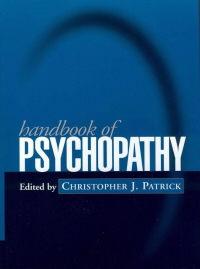
Editorial Review
With contributions from foremost experts, this authoritative handbook provides a state-of-the-science review of current knowledge on the psychopathic personality. Coverage includes major theoretical models; conceptual and definitional questions; assessment approaches; and etiological pathways, ranging from family and environmental factors to genes, neurotransmitters, and brain systems.
Manifestations of psychopathy in specific populations are addressed, as are links to salient problem behaviors such as aggression, substance abuse, sexual offending, and recidivism. Clinical and legal issues are also examined in depth. Seamlessly edited, each major thematic section concludes with a summary chapter that integrates the findings presented and highlights key questions for future research.
See following link for more details:
February 2007
Criminal Profiling: Principles and Practice
Editorial Review
Criminal Profiling: Principles and Practice provides a compendium of original scientific research on constructing a criminal profile for crimes that are not readily resolvable by conventional police investigative methods. Leading profiling expert Richard N. Kocsis, PhD, utilizes a distinct approach referred to as Crime Action Profiling (CAP), a technique that has its foundations in the disciplinary knowledge of forensic psychology.
The initial four chapters examine the skills, accuracy, components, and processes surrounding the construction of a criminal profile. The next two chapters focus on CAP research, the methods developed for the profiling of violent crimes and describing a systematic method for the interpretation and use of the CAP models. The subsequent three chapters canvass the respective CAP studies undertaken for crimes of serial rape, serial/sexual murder, and serial arson.
An explanation for how each of the models is developed is also given. The final chapters of the book are devoted to the geographical analysis of crime patterns and to a discussion of the format conventions and procedural guidelines for developing a criminal profile. Offering a scientifically grounded method for the construction of a criminal profile,
Criminal Profiling: Principles and Practice provides law enforcement personnel, forensic psychologists and psychiatrists, criminologists, and forensic investigators with a step-by-step, practical guide for understanding and applying CAP techniques for the construction of a criminal profile in a systematic and replicable manner.
"Crime Action Profiling, placed within the framework of scientific psychology encompassing research, theory, and practical application sets this new book apart from all others." (Louis B. Schlesinger Professor of Forensic Psychology, John Jay College of Criminal Justice).
See following link for more details:
Criminal Profiling: Principles and Practice
January 2007
The Handbook of Forensic Psychology
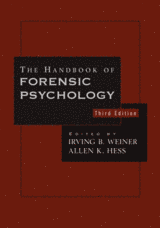
Editorial Review
This is a fully-revised and updated version of the top academic work in forensic psychology. Focussed mainly on the practical aspects of forensics, this volume provides all readers need to know to be effective practioners. Detailed sections cover both civil and criminal forensic practice; forensic report writing; treating mental illness in the incarcerated; and ethical issues. Contributors are the best-known and most respected practitioners in the field from the US and Canada.
All chapters are completely revised from the previous edition, including 6 which have new authors. Forensic psychology is one of the fastest-growing specialties in the field. Its practitioners are able to avoid managed care and structured settings, and they often focus on assessment, rather than long-term treatment of clients. With the growing public interest in all things forensic, most graduate programs in psychology have added at least one course in forensic psychology over the past few years; and more established professionals are entering the field every day.
See following link for more details:
The Handbook of Forensic Psychology
Visitors From The UK Click Here
December 2006
Forensic Psychology

Editorial Review
Introducing a forensic psychology text written from the scientist-practitioner perspective.
This text introduces the reader to the practice of forensic psychology. Forensic psychology, as defined by the American Psychological Association, is the application of clinical specialties to the legal arena. The emphasis of the book is to help students understand the practice of forensic psychology along with career opportunities in this rapidly evolving specialty. Included are several chapters on the area of legal psychology.
Areas covered in forensic psychology include a chapter on the ethics of psychology and law, an extensive chapter on assessment in forensic practice, criminal responsibility and competency evaluations, child custody evaluations, police psychology, correctional psychology, and evaluations of psychological injury. Areas covered in the specialty of legal psychology include trial consultation, criminal investigative psychology (detection of deception, criminal profiling, psychological autopsies and use of hypnosis) and eyewitness memory and recovered memories. A final chapter identifies emerging trends in the area of forensic psychology.
Instructor's ancillary materials are also available, including Power Point slides to accompany each chapter, a test bank with over 600 multiple choice, true/false questions, review questions for each chapter and sample syllabi complete with learning objectives for each chapter.
Notable Features
Every chapter offers an overview of a particular area of practice and then provides details on the specific practices within that area of forensic psychology.
Key concepts at beginning of each chapter to orient readers to the new material.
Case examples when appropriate, including examples from the author's clinical work.
Definitions of new terms in the page margins where the concept first appears.
Career information for each area of practice including necessary training and average starting salaries.
Brief summary at the end of each chapter.
An extensive list of nearly 200 web sites to professional organizations with a brief description of each site.
The text is softcover, helping to keep the cost low.
Special Note
I have a copy of this excellent book myself. I receive numerous e-mails from aspiring forensic psychologists asking a range of questions relating to career paths, applied practice, training, potential earnings etc, and this always is the book I recommend for those wanting definitive answers.
See following link for more details:
Visitors From The UK Click Here
NOVEMBER 2006
Snakes in Suits: When Psychopaths Go to Work

Editorial Review
Let's say you're about to hire somebody for a position in your company. Your corporation wants someone who's fearless, charismatic, and full of new ideas. Candidate X is charming, smart, and has all the right answers to your questions. Problem solved, right? Maybe not.
We'd like to think that if we met someone who was completely without conscience -- someone who was capable of doing anything at all if it served his or her purposes -- we would recognize it. In popular culture, the image of the psychopath is of someone like Hannibal Lecter or the BTK Killer. But in reality, many psychopaths just want money, or power, or fame, or simply a nice car. Where do these psychopaths go? Often, it's to the corporate world.
Researchers Paul Babiak and Robert Hare have long studied psychopaths. Hare, the author of Without Conscience, is a world-renowned expert on psychopathy, and Babiak is an industrial-organizational psychologist. Recently the two came together to study how psychopaths operate in corporations, and the results were surprising. They found that it's exactly the modern, open, more flexible corporate world, in which high risks can equal high profits, that attracts psychopaths. They may enter as rising stars and corporate saviors, but all too soon they're abusing the trust of colleagues, manipulating supervisors, and leaving the workplace in shambles.
Snakes in Suits is a compelling, frightening, and scientifically sound look at exactly how psychopaths work in the corporate environment: what kind of companies attract them, how they negotiate the hiring process, and how they function day by day. You'll learn how they apply their "instinctive" manipulation techniques -- assessing potential targets, controlling influential victims, and abandoning those no longer useful -- to business processes such as hiring, political command and control, and executive succession, all while hiding within the corporate culture. It's a must read for anyone in the business world, because whatever level you're at, you'll learn the subtle warning signs of psychopathic behavior and be able to protect yourself and your company -- before it's too late.
See following link for more details:
Snakes in Suits: When Psychopaths Go to Work
Visitors From The UK Click Here
OCTOBER 2006
Minds on Trial: Great Cases in Law and Psychology
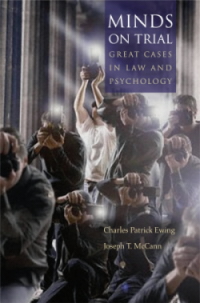
Editorial Review
In recent years, the public has become increasingly fascinated with the criminal mind. Television series centered on courtroom trials, criminal investigations, and forensic psychology are more popular than ever. More and more people are interested in the American system of justice and the individuals who experience it firsthand.
Minds on Trial: Great Cases in Law and Psychology gives you an inside view of 20 of the highest profile legal cases of the last 50 years. Drs. Ewing and McCann take you "behind the scenes" of each of these cases, some involving celebrities like Woody Allen, Mike Tyson, and Patty Hearst, and explain the impact they had on the fields of psychology and the law. Many of the cases in this book, whether involving a celebrity client or an ordinary person in an extraordinary circumstance, were determined in part by the expert testimony of a psychologist or other mental health professional.
Psychology has always played a vital role in so many aspects of the American legal system, and these fascinating trials offer insight into many intriguing psychological issues. In addition to expert testimony, some of the issues discussed in this entertaining and educational book include the insanity defense, brainwashing, criminal profiling, capital punishment, child custody, juvenile delinquency, and false confessions.
In Minds on Trial, the authors skillfully convey the psychological and legal drama of each case, while providing important and fresh professional insights. Mental health and legal professionals, as well as others with an interest in psychology and the law will have a hard time putting this scholarly, yet readable book down.
See following link for more details:
Minds on Trial: Great Cases in Law and Psychology
Visitors From The UK Click Here
Go From Forensic Psychology Book Of The Month Back To The Home Page
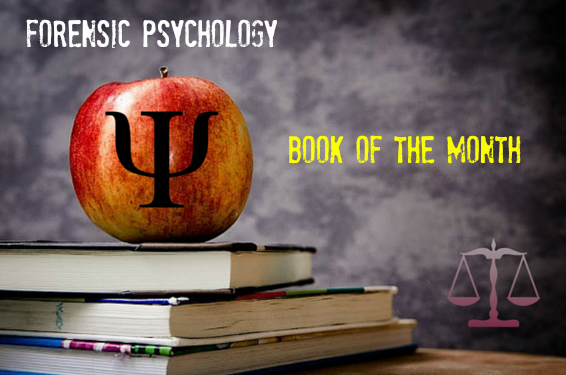
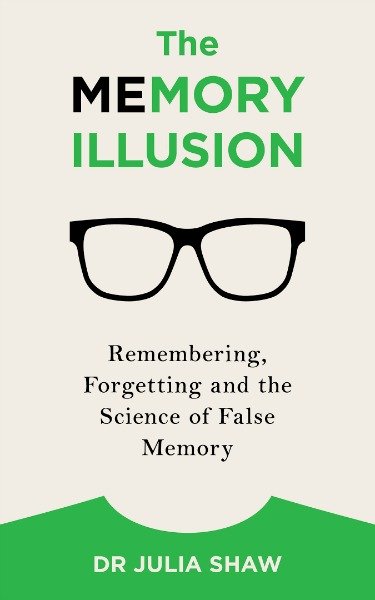
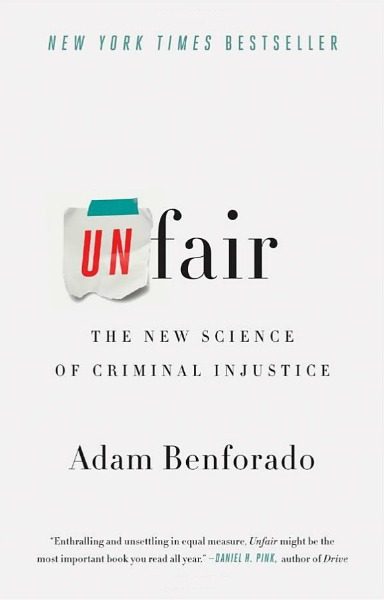
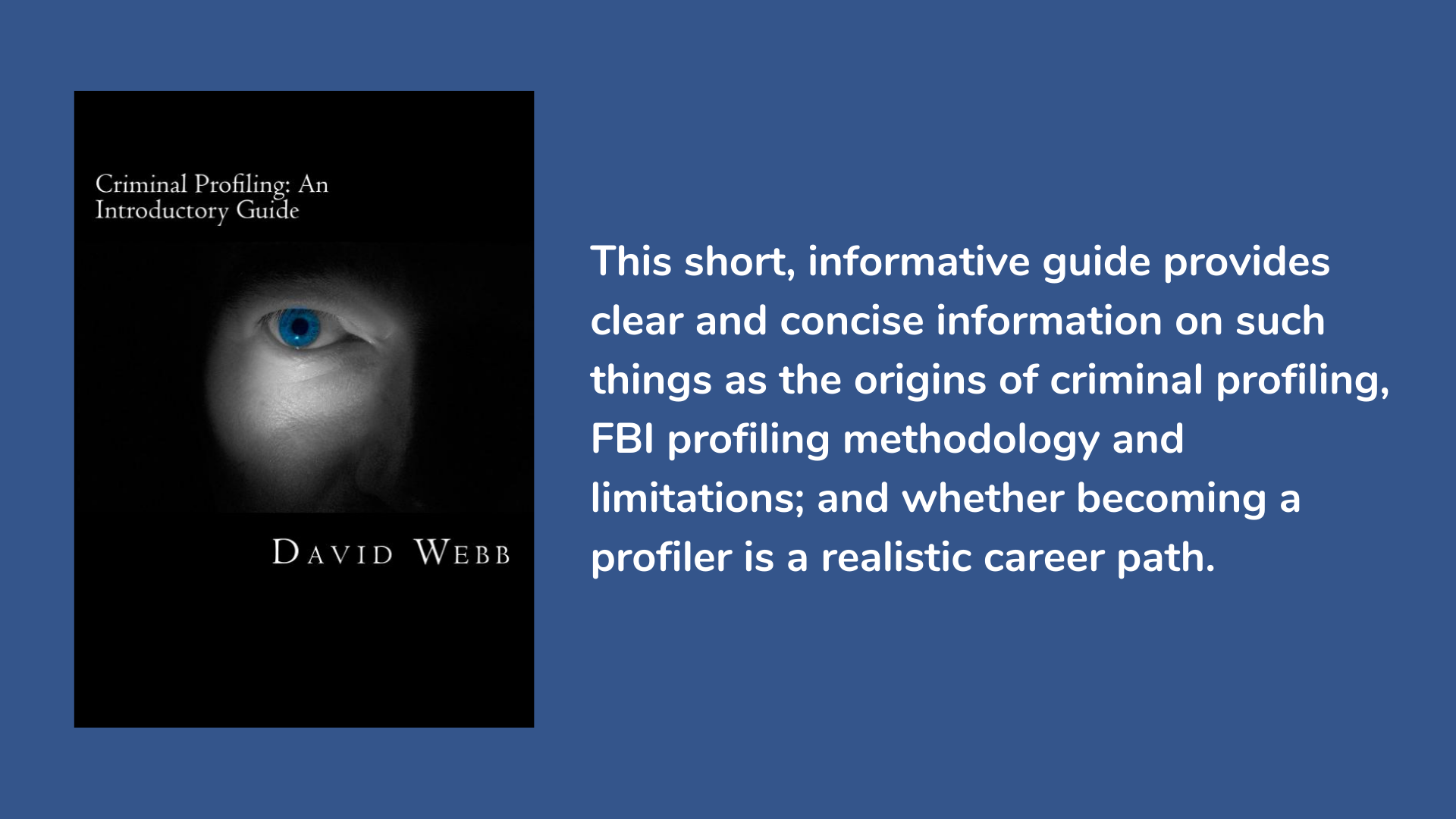
New! Comments
Have your say about what you just read! Leave me a comment in the box below.